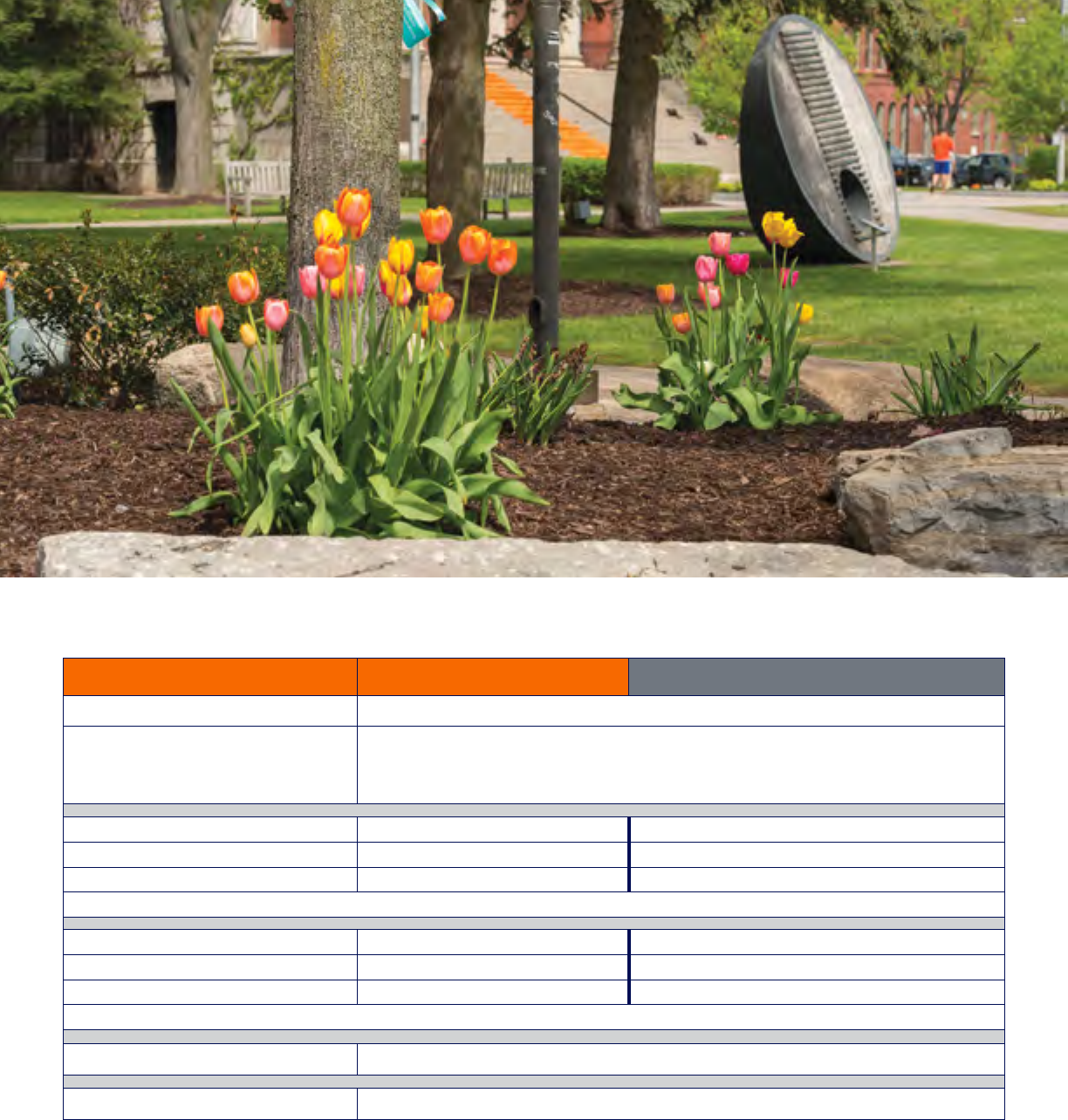
2024
Benefits Guide

Benefit Administrators: Contact Information
Plan Provider Contact information
Medical Benefit Excellus BlueCross BlueShield (BCBS) 800.493.0318 (TTY: 800.662.1220)
ExcellusBCBS.com/syredu
Prescription Drug
Benefit
Optum Rx 866.854.2945 (TTY: 711)
optumrx.com
Flexible Spending
Accounts
HealthEquity 877.924.3967
(TTY: 866.353.8058 / International TTY: 602.267.3826)
wageworks.com
Dental Benefit Delta Dental 800.932.0783 (TTY: 711)
deltadentalins.com
Vision Benefit VSP Vision 800.877.7195 (TTY: 800.428.4833)
vsp.com
Dental/Vision and Disability
Plan for SEIU Members
Service Employees Benefit Fund (SEBF) 855.835.9720
sebf.org
Life Insurance MetLife (HR Shared Services is
record keeper)
315.443.4042 or hrservice@syr.edu
HR Shared Services
Auto and Home
Insurance
Farmers Insurance Group 800.438.6388
Long Term Disability
Insurance
The Standard 800.426.4332
Retirement Benefit Plan TIAA 855.842.2873 (TTY: 800.842.2755)
tiaa.org/syr
Dependent and Remitted
Tuition
Syracuse University 315.443.4042 or hrservice@syr.edu
HR Shared Services
Faculty and Staff Assistance
Program (FSAP)
Carebridge 800.437.0911 (TTY: 711)
Care. for Business Care. for Business 855.781.1303 or Care. for Business
Helpful University Contact Information
Syracuse University Office of Human Resources – hr.syr.edu
HR Shared Services 315.443.4042 or hrservice@syr.edu
Other Syracuse University Departments
Barnes Center at The Arch Recreation
College of Professional Studies
Equal Opportunity, Inclusion and Resolution Services
Hazard Communication Training
I.D. Card Services
Information Technology Services
Lesbian, Gay, Bisexual, Transgender and Queer (LGBTQ) Resource Center
Parking and Transportation Services
Payroll
Public Safety (Communications Center)
Real Estate Office
315.443.8000
315.443.9378
315.443.4018
315.443.4132
315.443.2721
315.443.2677
315.443.0228
315.443.4652
315.443.4042
315.443.2224
315.443.2104

1
SYRACUSE UNIVERSITY
Welcome to Syracuse University
We are pleased to have you join our team of talented faculty and staff who work to deliver the best
experience possible for our students—on campus, across the country and around the world.
This booklet provides an overview of the comprehensive benefits program that provides flexibility and
choice to meet the unique needs of our employees. Beyond the basics found in this guide, you’ll want to
review the details found on the Human Resources website, hr.syr.edu, which is continually updated with
the most current benefit information.
Should you have any questions, or require accommodations to access any information within this
booklet, please reach out to HR Shared Services at 315.443.4042 or via email at hrservice@syr.edu.
We hope you find this information to be a valuable resource as you begin your University career, and
we wish you much success in your new role.
Sincerely,
Office of Human Resources

2
BENEFITS GUIDE
Table of Contents
New Employee Checklist ............................................................................................................................................................3
Benefits Quick Guide ...................................................................................................................................................................5
Retirement Planning .....................................................................................................................................................................6
Health Benefits .............................................................................................................................................................................8
Dental and Vision Benefits ......................................................................................................................................................13
Flexible Spending Accounts (FSAs) .....................................................................................................................................16
Wellness and WorkLife Resources ........................................................................................................................................ 16
Life Insurance .............................................................................................................................................................................. 17
Disability Benefits ......................................................................................................................................................................18
Workers’ Compensation .......................................................................................................................................................... 18
Voluntary Long Term Disability Insurance ...........................................................................................................................18
Remitted Tuition Benefits.........................................................................................................................................................19
Dependent Tuition Benefits ....................................................................................................................................................20
Paid Time Off for Staff ..............................................................................................................................................................21
Leaves of Absence ..................................................................................................................................................................... 21
Caregiving Resources ...............................................................................................................................................................21
Live Local .....................................................................................................................................................................................21
Auto and Home Insurance .......................................................................................................................................................21
Travel Resources ........................................................................................................................................................................21
Identification Cards ...................................................................................................................................................................21
Adoption Assistance ................................................................................................................................................................. 21
Lesbian, Gay, Bisexual, Transgender and Queer (LGBTQ) Resource Center .............................................................22
Information Technology Services...........................................................................................................................................22
Notice of Special Enrollment Rights......................................................................................................................................23
Continuation of Health Coverage/COBRA ........................................................................................................................24
Notice of Privacy Practices .....................................................................................................................................................27
Notice Regarding the Women’s Health and Cancer Rights Act of 1998 .....................................................................30
Summary of Benefits and Coverage (SBC) ......................................................................................................................... 30

3
SYRACUSE UNIVERSITY
New Employee Checklist
On or Before Your First Day:
n
Complete your Employment Eligibility Verification (I-9) form at Human Resources (HR). Bring your required documentation.
n
Activate your NetID at netid.syr.edu, so that you have access to online resources and services such as:
• Email
• Electronic documents
• MySlice, the University web portal where you access the University’s benefits enrollment site and other employee services
n
Obtain an identification card from the Office of Housing, Meal Plan and I.D. Card Services. Submit your photo by emailing
idcard@syr.edu and follow the guidelines for photo submission by viewing housingmealplans.syr.edu/idcards/photo-submission.
When your new card is ready, you will receive an email directing you when and where to pick up the card.
n
Complete your Pay Notice Acknowledgment in the Payroll section of MySlice.
n
Complete a retirement plan waiting period waiver form, if applicable.
First Week:
n
Sign up for direct deposit of your pay and update your federal and/or state tax withholding status and allowances in the Payroll section
of MySlice.
n
Review the Orange Alert information and provide your preferred contact information in the Personal Profile section of MySlice.
n
Schedule your Hazard Communication Training online at ehss.syr.edu/about/training.
n
If your duties will include accounting and payroll tasks, visit bfas.syr.edu/comptroller/resources/training/ to register for applicable
training. For additional training regarding the General Ledger Financial Reports, please contact General Accounting at 315.443.2522
or genacctg@syr.edu.
First Month:
n
Review benefits information and enroll as soon as possible.
IMPORTANT: You must enroll within the first 31 days of employment to commence benefits as of your hire date.
n
Attend New Employee Orientation. New Employee Orientation sessions are regularly held, and you should receive an
email from Human Resources with details about the next session.

4
BENEFITS GUIDE

5
SYRACUSE UNIVERSITY
Benefits Quick Guide
Eligibility
You are eligible for benefits the day you begin your benefits-
eligible position. Refer to the University’s benefits eligibility policy
(hr.syr.edu/eligibility) to determine which dependents are eligible
for coverage.
Retirement
You may contribute to the University's 403(b) retirement plan
immediately upon hire by electing pre-tax and/or after-tax Roth
403(b) contributions. Upon reaching your one-year anniversary, the
University will contribute 10% of your eligible pay, subject to annual
IRS maximums. The one-year waiting period may be waived for those
who qualify.
Health Insurance
Three comprehensive medical options are available through
Excellus BCBS (hr.syr.edu/medical), with prescription drug coverage
through Optum Rx (hr.syr.edu/rx).
Dental and Vision
Preventive and comprehensive coverage is available through Delta
Dental. You can add vision coverage to your dental coverage through
VSP (hr.syr.edu/dental).
Flexible Spending Accounts
Withhold salary on a pre-tax basis for reimbursement of eligible out-
of-pocket health care expenses and dependent care expenses. The
maximum withholding is $3,200 for medical expenses and $5,000
per household for dependent care (hr.syr.edu/fsa).
Wellness
The Syracuse University Wellness Initiative provides learning
opportunities, activities, programs and other resources to empower
and encourage you to make decisions that lead to a balanced
and healthy lifestyle. Learn about upcoming programs at
wellness.syr.edu.
Faculty and Staff Assistance Program
Counselors are available for confidential consultation, assessment,
referrals and counseling through Carebridge. Licensed, credentialed
counselors are available 24 hours a day, seven days a week, 365 days
a year by calling 800.437.0911 (TTY: 711).
Disability and Life Insurance
Income replacement benefits are available for short and long term
disabilities. The University also provides basic life and accidental
death & dismemberment (AD&D) protection, with the option to
purchase additional coverage for you and your dependents
(hr.syr.edu/life-and-disability).
Tuition
Dependent tuition is available after you complete the equivalent
of three full-time years of service for eligible dependent children
attending Syracuse University or other participating institutions.
In addition, remitted tuition benefits for you and your eligible
spouse/same-sex domestic partner may be used toward graduate
and undergraduate coursework. Visit hr.syr.edu/tuition for more
information.
Paid Time Off
The University provides you with time to enjoy away from work, as
well as to protect you and your loved ones in times of sickness. Be sure
to review and understand the time off that you are eligible for through
your University benefits (hr.syr.edu/timeoff).
Caregiving Resources
The University provides a variety of support to assist with child and
dependent care needs, including access to a free premium membership
to the caregiving website Care. for Business, a dependent care
subsidy program, flexible work arrangements and more.
Additional Benefits
Auto and home insurance, recreational facilities, travel assistance,
career development, will preparation services, adoption assistance
and a guaranteed mortgage program are also available as part of the
University’s comprehensive benefits program.

6
BENEFITS GUIDE
Retirement Planning
The University offers you the opportunity to save in tax-deferred and tax-advantaged accounts and will contribute to those accounts if you
are eligible. The accounts are administered by TIAA and you can select from a variety of investment options. You can change your contribution
amount and investment elections at any time. For assistance with changing your contributions contact HR Shared Services at 315.443.4042
or hrservice@syr.edu. For assistance with changing your investment elections visit tiaa.org/syr or contact TIAA at 855.842.CUSE (2873)/
TTY: 800.842.2755.
Retirement Plan Investment Options
One-step investing is easy when you select a single lifecycle fund. Select the T. Rowe Price Target Date Fund for the year closest to your
anticipated retirement date. The fund invests more aggressively the longer you have until retirement and will adjust its mix of assets (stocks,
bonds and cash) to become more conservative as retirement approaches.
Want to design your own investment mix? Choose from actively managed or passive funds, including fixed and variable annuities, mutual funds,
inflation-protected securities and real estate funds.
If you do not select your investments when you first enroll, contributions will automatically go into the T. Rowe Price Target Date Fund for the
year closest to the year you will reach age 65.
Categories to the left have potentially more inflation risk
and less investment risk
Categories to the right have potentially less inflation risk
and more investment risk
Guaranteed
Money
Market
Fixed Income/
Bond Funds
Hybrid and Target
Date Funds
Domestic Equity
Real Estate
International/
Global Equity
Value Blend Growth
TIAA
Traditional*
CREF Money
Market
Account*
BlackRock
High Yield
Bond Fund
CREF Social
Choice
Account*
Delaware
Small-Cap
Value
CREF Stock
Account*
MFS Mid-Cap
Growth Fund
TIAA Real
Estate
Account*
American
Funds
EuroPacific
Growth
TIAA Stable
Value**
Vanguard
Federal
Money
Market
CREF
Inflation-
Linked Bond
Account*
T. Rowe Price
Target Date
Funds
JP Morgan
Equity
Income
TIAA-CREF
Small-Cap
Equity
T. Rowe Price
Blue Chip
Growth
TIAA Real
Estate
Securities
Fund*+
Vanguard
Total
International
Stock Index
PIMCO
Total Return
Victory
Established
Value
Vanguard
Extended
Market Index
Vanguard
Total Bond
Market Index
Vanguard
Institutional
Index
Syracuse University's retirement plan investment options are subject to change. For more information and a complete list of investment options available, please visit tiaa.org/syr.
*Any guarantees under annuities issued by Teachers Insurance Annuity Association of America ("TIAA") are subject to its claims-paying ability. TIAA Traditional is a guaranteed
insurance contract and not an investment for federal securities law purposes. Payments under CREF and the TIAA Real Estate Account are variable and will rise or fall based
on investment performance. The TIAA Real Estate Account is a portfolio that has a direct investment exposure to commercial real estate. Returns are derived from properties
appreciating in value and rental income and will generally be more fixed income-like.
**The TIAA Stable fund is only available for University contributions to the Syracuse University Noncontributory Retirement Plan (101201).
*+The TIAA-CREF Real Estate Securities Fund is a mutual fund which invests primarily in real estate investment trusts (REITs). The volatility of this fund is equity-like and therefore
significantly higher than the TIAA Real Estate Account.
Your Retirement Plan Contributions
Upon employment, you are immediately eligible to contribute to
the University’s retirement plan. You can contribute either a flat
dollar amount or a percentage of your pay each pay period, up to the
maximum amount permitted by law, which is adjusted each year. This
year’s limits can be found by visiting hr.syr.edu/retirement-planning.
If you made contributions to a previous employer’s plan during the
calendar year, the combination of all of your contributions cannot
exceed the annual maximum.
To enroll, complete your new hire enrollment through MySlice
or return the 403(b) Salary Reduction Form to HR, which can be
found at hr.syr.edu/forms. You may elect pre-tax and/or after-tax
Roth 403(b) contributions.

University Retirement Plan Contributions
Upon completion of your first year of employment, the University will
contribute 10% of your eligible pay, subject to annual IRS maximums
and the terms of the Syracuse University Noncontributory Retirement
Plan.
Making Changes to Your Investments
If you do not make an investment election, the University’s
contribution will automatically be invested in a T. Rowe Price Target
Date Fund for the year closest to the year you reach age 65. You
can make changes to this investment and the investments of your
own contributions online at tiaa.org/syr or by contacting TIAA at
855.842.CUSE (2873)/TTY: 800.842.2755.
Waiving the One-Year Waiting Period
In general, the one-year waiting period to receive the University
contribution may be waived for faculty and staff joining the
University from another accredited four-year institution that confers
a baccalaureate degree, certain affiliates or research organizations. In
order to waive the University’s one-year waiting period, you must meet
the criteria provided on the waiver form. The waiver form, which must
be completed by you and your previous employer, can be found at
hr.syr.edu/forms. Once the waiver form has been completed by your
previous employer, you should review it for accuracy, sign and date
it, and return it to HR Shared Services either by fax (315.443.1063)
or email (hrservice@syr.edu). This waiver will go into effect and
the University’s contributions will begin after the completed form
is approved and processed by HR Shared Services. Please keep in
mind that there is no retroactive contribution of the University’s
contribution, so you are encouraged to complete the waiver form as
soon as possible to maximize the amount you are eligible to receive
from the University.
Financial Counseling at No Additional Cost
TIAA offers personalized advice and education services to help
you reach your retirement goals at no additional cost. To schedule
a meeting with one of the University’s dedicated TIAA financial
consultants, or for assistance with your account, contact TIAA at
855.842.CUSE (2873)/TTY: 800.842.2755, or sign up online
at tiaa.org/syr. In addition, the University provides a variety of
resources to help you plan for a successful retirement. Be sure to check
out hr.syr.edu/financial-wellness to see the many tools available to
support your personal financial goals.
Designate a Beneficiary
A beneficiary is the person or organization who will receive the money
in your accounts if you pass away. You can name primary beneficiaries,
who receive the money if they are alive when you pass away, and
contingent beneficiaries, who receive the money if your primary
beneficiaries pass away before you. You can update your beneficiary
designations at any time.
In general, if you’re married, your spouse must consent in writing if you
choose to name someone else as your primary beneficiary. If you don’t
name a beneficiary, the plan rules will determine who receives your
account. Naming a beneficiary ensures that your wishes are followed.
7
SYRACUSE UNIVERSITY
8
BENEFITS GUIDE
Health Benefits
Syracuse University is committed to providing comprehensive health
plan options for our faculty and staff. Three health insurance options
are available: SUBlue, SUOrange and SUPro. All three options include
medical coverage administered by Excellus BCBS and prescription
drug coverage administered by Optum Rx. In general, the same
services are covered under all three plans, but with a different
deductible and copay/coinsurance structure.
Benefits Eligibility
You are eligible to enroll as of your date of hire. Generally, you
may cover your legal spouse or eligible domestic partner, and your
children up to age 26 under your health coverage. Please refer to the
University’s Benefits Eligibility Policy online at hr.syr.edu/eligibility
to determine if your dependents are eligible for coverage. You must
show documentation of your dependent’s relationship to you before
your dependent will be approved for coverage.
Medical Benefits
SUBlue and SUPro allow members to receive services from any
provider, subject to certain plan restrictions. When you receive health
care, your coverage will be determined by whether the provider
participates in the network, as described below.
• In-Network: Services must be performed by a provider
that participates with the local Excellus BCBS network or
the national BlueCard network, regardless of their location.
Coordination with your Primary Care Physician (PCP) is not
required.
• Out-of-Network: Services are performed by a provider that
does not participate in the Excellus BCBS network.
SUOrange restricts coverage to only those providers that participate
with Excellus BCBS or the national BlueCard network.
Coverage for International Travel: When traveling outside the
United States, you have access to in-network providers in over
200 countries worldwide. If you receive health care services from
a participating BCBS Global Core provider, generally you can
present your ID card and pay the applicable deductible and copay/
coinsurance under SUBlue, SUOrange or SUPro.
If you see an international provider who doesn’t participate in the
BCBS Global Core network, you will need to pay for those services
at the time they are rendered. If you’re enrolled in SUBlue or SUPro,
you can submit those claims to Excellus BCBS for reimbursement as
though the providers were participating; however, there is no coverage
for non-participating providers in the SUOrange plan.
Online Tools and Resources for Medical Benefits: Set up an account
through the excellusBCBS.com/syredu secure member website for
a full suite of online tools. You can view your benefits, eligibility and
claims and search for participating providers and facilities. You can
also download the Excellus BCBS mobile app for instant access to
your member ID card and claims information. Excellus BCBS also
offers member assistance through their dedicated customer service
unit at 800.493.0318 (TTY: 800.662.1220).
Prescription Drug Benefits
Optum Rx is the pharmacy benefit manager for Syracuse University.
The benefit provides many convenient ways to obtain your
prescriptions. Visit hr.syr.edu/rx for coverage details.
Generic Drugs
To encourage the appropriate use of generic medications, if a generic
equivalent is available and you choose to have the brand name drug, or
your doctor writes “Dispense As Written” (DAW) on your prescription
to ensure that you get the brand name drug, generally you will be
required to pay the generic, tier one copay plus the difference in cost
between the brand name drug and the generic drug.
Biotech/Specialty Drugs
Prescription drugs in the biotech/specialty class are required to be
filled through mail order by Optum Specialty Pharmacy and may be
limited to a 30-day supply per refill. Your cost will follow the mail
order schedule for your medical plan option, but for a 30-day supply.
Contact Optum Specialty Pharmacy at 844.265.1761 (TTY: 711) to
learn more about specialty medications.
Home Delivery
If you take certain prescription medications on an ongoing basis,
you can fill your prescriptions using home delivery, which offers
convenient mail order service with free standard shipping. Enroll in
home delivery online at optumrx.com.
Have your doctor write your prescription for up to a 90-day supply
with three refills. Your doctor can call, fax or electronically prescribe
your medication for home delivery. Some medications, including
pre-packaged medications and controlled substances, may not be
available in a supply greater than 30 days per order. Home delivery
orders are generally received within 14 days, but you will be notified
if there will be a delay with your shipment. Call Optum Rx at
866.854.2945 (TTY: 711) for assistance with home delivery.
When you use mail order, the plan’s mail order cost sharing applies,
which is different than the cost sharing at a retail pharmacy. This may
result in significant savings in your out-of-pocket costs, but savings
vary for each medication and savings are not guaranteed.
Retail 90-Day Network
You may fill a 90-day supply at a local participating pharmacy, instead
of using the mail order option, and pay the retail cost share for your
plan option.
Online Tools and Resources for Prescription Drug Benefits
Set up your account at optumrx.com, the secure member website for
prescription drug benefits. Then you can view your claim history, view/
print your member ID card, find participating pharmacies, estimate
the cost of prescriptions and much more. The Optum Rx mobile app
gives you access from anywhere.

9
SYRACUSE UNIVERSITY
2024 Health Plan: Monthly Employee Contributions
SUBlue SUOrange SUPro
Schedule A Schedule B Schedule A Schedule B Schedule A Schedule B
Employee $165.21 $140.66 $160.40 $136.56 $150.67 $128.27
Employee + Spouse/Domestic Partner $421.60 $309.43 $409.49 $300.43 $386.89 $282.20
Employee + Child(ren) $367.37 $271.46 $356.80 $263.56 $336.91 $247.57
Employee + Spouse/Domestic Partner +
Child(ren)
$608.24 $440.24 $590.82 $427.43 $558.84 $401.49
Contributions listed here are based on the 12-month calendar year. The actual deduction from your paycheck depends on your deduction cycle.
Reduced Medical Contributions: Schedule B
Employees will pay the Schedule A contribution rates for health plan coverage unless they qualify, apply and are approved for reduced Schedule
B contributions. Applications must be received within 31 days of your date of hire and resubmitted each year during Open Enrollment. Eligibility
for Schedule B contributions is based on household income and household size according to the chart below (subject to change each year).
For 2024, the eligibility guidelines are:
Household Size Household Income
1 Less than $53,250
2 Less than $74,550
3 Less than $95,850
4 Less than $117,150
5 Less than $138,450
6 and up Less than $159,750
Household size is the number of individuals declared on your most recent federal income tax return and the return for your spouse or domestic
partner, if filed separately. Included in household size are your children who are not declared on your tax return, but are either under age 19 and
living with you, or age 19 or older and enrolled on your medical plan. Household income is the combined adjusted gross income reported on your
(combined) federal income tax returns.
Additional information about Schedule B contributions, including the application form, is available online at hr.syr.edu/scheduleb.

10
BENEFITS GUIDE
2024 Health Plan: Schedule of Benefits
The following chart shows your cost sharing for some commonly used health care services. The complete benefit summary and coverage features
of each plan option can be found in the Medical Booklet, posted online in MySlice.
SUBlue SUPro
SUOrange
Out-of-Network In-Network Out-of-NetworkIn-Network
Annual
Deductible
1
$150 per individual
with a maximum of
$300 per family
$300 per individual with
a maximum of $1,000
per family
$200 per individual
with a maximum of
$400 per family
$300 per individual with
a maximum of $1,000
per family
Coinsurance Generally, no
coinsurance. Certain
exceptions apply. See
the Medical Booklet
for information.
30% allowable amount
plus the difference
between provider’s
charge and the allowable
amount. Certain
exceptions apply.
See the Medical Booklet
for information.
5% of allowable amount for
inpatient hospitalization
- or -
20% of allowable amount
for other services, except
as otherwise noted in the
Medical Booklet
5% of allowable amount for
inpatient hospitalization
- or -
30% of allowable amount
for other services, except
as otherwise noted in the
Medical Booklet
- plus -
Difference between
provider's charge and the
allowable amount
Annual Out-of-Pocket
Maximum
2
$2,000 per individual
with a maximum of
$4,000 for a family
$6,000 per individual
with a maximum of
$12,000 for a family
$1,500 per individual with
a maximum of $3,000 for
a family
$6,000 per individual
with a maximum of
$12,000 for a family
Routine Preventive
Screenings
No deductible or
copay; paid in full
Deductible plus
coinsurance
No deductible or
coinsurance; paid in full
Deductible plus
coinsurance
Routine Preventive Screenings include, but are not limited to, the following (certain restrictions apply, contact Excellus BCBS
with any questions):
• Breast Cancer Screenings (one per calendar year for ages 35 and older, with exceptions if high risk; both preventive and diagnostic
screenings are covered in full through an in-network provider)
• Prostate Cancer (one per calendar year for ages 50 and older, with exceptions if high risk)
• Cervical Cancer (one per calendar year for ages 18 and older)
• Colonoscopy
This list is subject to change based on guidelines issued by the United States Preventive Services Task Force and the Advisory Committee
on Immunization Practices.
Well Child Visits
Birth to 2nd birthday:
11 visits
2nd birthday to
3rd birthday: 2 visits
3rd birthday to
19th birthday: 1 visit
per calendar year
No deductible or
copay; paid in full
Deductible plus the
difference between
provider’s charge and
allowable amount
No deductible or
coinsurance; paid in full
Deductible plus
coinsurance
Routine Adult Physical
(one per calendar year)
No deductible or
copay; paid in full
Deductible plus the
difference between
provider’s charge and
allowable amount
No deductible or
coinsurance; paid in full
Deductible plus
coinsurance
The plan’s payments for covered out-of-network benefits described in the booklet section titled “SPECIAL OUT-OF-NETWORK BENEFITS/PROTECTION AGAINST
SURPRISE MEDICAL BILLS” will be determined in accordance with the provisions of that section and may be different than the description in this schedule.

11
SYRACUSE UNIVERSITY
SUBlue SUPro
SUOrange
Out-of-Network In-Network Out-of-NetworkIn-Network
Physician Office Visits Deductible plus $35
copay (PCP)
3
or
deductible plus $50
copay (Specialist)
Deductible plus $35
copay and coinsurance
(PCP) or deductible
plus $50 copay and
coinsurance (Specialist)
Deductible plus
coinsurance
Deductible plus
coinsurance
Urgent Care Facility
Visit
Deductible plus $50
copay
Deductible, $50 copay
and coinsurance
Deductible plus
coinsurance
Deductible plus
coinsurance
Hospital Emergency
Room
Deductible plus
$150 copay
In-network deductible
plus $150 copay
Deductible plus
coinsurance
In-network deductible plus
in-network coinsurance
Inpatient Hospital Deductible plus $350
copay per admission
Deductible, $350
copay per admission
and coinsurance
Deductible plus
coinsurance
Deductible plus
coinsurance
Outpatient Surgery
(performed at a
hospital)
Deductible plus $200
copay
Deductible, $200
copay and coinsurance
Deductible plus
coinsurance
Deductible plus
coinsurance
Diagnostic Machine
Tests, X-Rays and
Radiology Services
Deductible plus $50
copay
Deductible, $50 copay
and coinsurance
Deductible plus
coinsurance
Deductible plus
coinsurance
Diagnostic Laboratory
Tests
No deductible or
copay; paid in full
Deductible and
coinsurance
Deductible plus
coinsurance
Deductible plus
coinsurance
Physical
Therapy
Deductible plus $35
copay
Deductible, $35 copay
and coinsurance
Deductible plus
coinsurance
Deductible plus
coinsurance
Maternity No deductible or
copay; paid in full
Deductible and
coinsurance
No deductible or
coinsurance; paid in full
Deductible plus
coinsurance
Telehealth (including
MDLIVE services and
provider-facilitated
visits)
Deductible plus
copay associated
with in-person visit
Deductible plus copay
associated with in-person
visit plus coinsurance
Deductible plus
coinsurance
Deductible plus
coinsurance
Chiropractic Services Deductible plus $50
copay
Deductible, $50 copay
and coinsurance
Deductible plus
coinsurance
Deductible plus
coinsurance
The plan’s payments for covered out-of-network benefits described in the booklet section titled “SPECIAL OUT-OF-NETWORK BENEFITS/PROTECTION AGAINST
SURPRISE MEDICAL BILLS” will be determined in accordance with the provisions of that section and may be different than the description in this schedule.
1
Unless otherwise noted, all plan options require the employee to pay an annual
deductible before any other cost sharing is determined. After the annual deductible
is satisfied, the employee must pay the copay or coinsurance, if applicable. For out-
of-network services, the coinsurance and/or copay is then applied to the balance of
the allowable amount. The employee is also responsible for the difference between
the provider’s charge and the allowable amount as defined by Excellus BCBS. Review
examples of how the deductible, copays and coinsurance apply at hr.syr.edu/medical.
2
Out-of-pocket maximum refers to the maximum amount of out-of-pocket expenses
an employee would pay in a calendar year. The out-of-pocket expenses are defined as
the deductibles, coinsurance and copayment amounts. Any member payment for the
difference between provider charges and the allowable amounts for out-of-network
services does not count toward the out-of-pocket maximum.
3
Copays for outpatient treatment related to mental health and substance use in SUBlue
and SUOrange are consistent with that of a PCP office visit.

12
BENEFITS GUIDE
Prescription Drug Coverage
SUBlue and SUOrange SUPro
Annual Deductible No deductible
Out-of-Pocket Maximum
(separate from the medical
out-of-pocket maximum)
$2,000 per individual with a maximum of $4,000 for a family
Retail: Tier 1 20% coinsurance* 15% coinsurance*
Retail: Tier 2 25% coinsurance 25% coinsurance
Retail: Tier 3 45% coinsurance 40% coinsurance
Receive up to a 30-day supply or up to a 90-day supply of maintenance medications at a retail pharmacy.
Mail Order: Tier 1 $20* Lesser of $15 or 15% coinsurance*
Mail Order: Tier 2 $50 Lesser of $45 or 25% coinsurance
Mail Order: Tier 3 $90 Lesser of $90 or 40% coinsurance
Receive up to a 90-day supply of maintenance medication through home delivery.
Specialty Mail Order Same as mail order except 30-day supply for most medications
Infertility Medications Follows above schedule for retail, mail order and specialty with a $20,000 lifetime maximum
* Certain prescription drugs are available at $0 copay (age, gender and other restrictions may apply; contact Optum Rx for more details
at 866.854.2945, TTY: 711).

13
SYRACUSE UNIVERSITY
Dental and Vision Benefits
There are two dental plan options offered by Delta Dental: Preventive and Comprehensive. Enrollment in a Delta Dental option is a two-year
commitment. A new two-year commitment cycle for the University’s dental and vision plans started Jan. 1, 2023. Elections made during
calendar year 2024 will be in effect through Dec. 31, 2024. In order to enroll in vision benefits with Vision Service Plan (VSP), you must first
enroll in a dental plan. Vision coverage is not available as a separate option.
2024 Dental With or Without Vision Plan: Monthly Employee Contributions
Preventive
Preventive
Plus Vision
Comprehensive
Comprehensive
Plus Vision
Employee $9.19 $13.91 $32.04 $36.76
Employee + Spouse/
Domestic Partner
$22.91 $32.36 $74.49 $83.94
Employee + Child(ren) $25.92 $36.18 $73.58 $83.84
Employee + Spouse/
Domestic Partner +
Child(ren)
$42.98 $59.37 $114.95 $131.34
Contributions listed here are based on the 12-month calendar year. The actual deduction from your paycheck depends on your deduction cycle.
Summary of University Dental Benefits
Regardless of which dental plan you choose, you can visit any licensed dentist, but you’ll maximize plan value by using a dentist who participates
in a Delta Dental network.
Delta Dental
PPO Dentist
Delta Dental
Premier Dentist
Non-Participating
Dentist
Plan
Allowance
Dentists are paid PPO
contracted fees. Your costs
are usually lowest.
Dentists are paid Premier
contracted fees. Your costs
are usually moderate.
Claims for services provided by non-participating
dentists will be processed using a maximum fee level
that may be higher than Delta Dental’s maximum plan
allowance. Your costs are usually highest.
Payment
Responsibilities
By agreement, participating dentists must accept contracted
fees as payment in full for covered services and cannot balance
bill you. Delta Dental’s benefit is a percentage of the maximum
plan allowance, which may require a coinsurance amount.
Deductibles may also apply. You are also responsible for costs
related to services that are not covered.
The benefit payment is sent directly to you. You are
responsible for any applicable coinsurance and/
or deductibles, plus any difference between Delta
Dental’s payment (the maximum plan allowance) and
the amount billed that exceeds this allowance. You are
also responsible for costs related to services that are
not covered.
Online Tools and Resources for Dental Benefits
Visit Delta Dental’s website at deltadentalins.com to:
• Locate participating dentists by location, specialty and
network type;
• Obtain eligibility and benefit information; or
• Check the status of a claim.
From a mobile phone, the website is streamlined so you can access
your ID card, benefit and claim information with just a few clicks. Call
Delta Dental at 800.932.0783 (TTY: 711) with any questions.

14
BENEFITS GUIDE
Summary of Delta Dental Benefits
The Preventive plan covers two annual exams and cleanings per calendar year. Coverage for basic and major dental care, including fillings,
scaling, extractions and root canals, is available if you select the Comprehensive plan.
Plan
Annual Deductible Per
Person
Family Deductible
Deductible for
Diagnostic and
Preventive Services
Annual Maximum Per
Person
Preventive
$0 $0 Waived $500
Comprehensive $50 (does not apply to
preventive services)
$150 (does not apply to
preventive services)
Waived $2,000
Delta Dental
PPO Dentist
Delta Dental
Premier Dentist
Non-Participating
Dentist
Service Examples of Covered Services
Paid by
Delta
Dental
Paid by
Patient
Paid by
Delta
Dental
Paid by
Patient
Paid by
Delta
Dental
Paid by
Patient
Preventive Plan Coverage
Diagnostic Exam and X-rays (two per calendar year) 100% 0% 100% 0% 100% 0%
Preventive Fluoride treatments (to age 19),
teeth cleaning, sealants (to age 14)
100% 0% 100% 0% 100% 0%
TMJ Temporomandibular joint
dysfunction treatment
50% 50% 50% 50% 50% 50%
Additional Coverage for Comprehensive Plan Only
Basic Restorative Fillings 80% 20% 60% 40% 60% 40%
Oral Surgery Extractions 80% 20% 60% 40% 60% 40%
Endodontics Root canal therapy 80% 20% 60% 40% 60% 40%
Periodontics Treatment of gum disorders 80% 20% 60% 40% 60% 40%
Prosthodontics Dentures, bridgework 50% 50% 50% 50% 50% 50%
Major
Restorative
Crowns 50% 50% 50% 50% 50% 50%
Stainless Steel
Crowns
On temporary teeth (only for children) 80% 20% 60% 40% 60% 40%

15
SYRACUSE UNIVERSITY
Summary of University Vision Benefits
The following is a summary of vision services and benefits provided through VSP:
Coverage Frequency Copay Plan Information
Exam Every calendar
year
$15 Routine exam only
Prescription Glasses
(lenses)
Every calendar
year
$25*
Single vision, lined bifocal and lined trifocal lenses
Polycarbonate lenses for dependent children
Prescription Glasses
(frames)
Every other
calendar year
$150 allowance for a wide selection of frames
$170 allowance for featured frame brands
20% savings on the amount over your allowance
$150 Walmart/Sam's Club frame allowance
$80 Costco frame allowance
Lens Options Every calendar
year
$0
$95-$105
$150-$175
Standard progressive lenses
Premium progressive lenses
Custom progressive lenses
Contact Lens Care Every calendar
year
Up to $60 $150 allowance for contacts.
Copay applies to contact lens exam (fitting and evaluation). Either frames or
contact lenses are covered in a calendar year. If you choose contact lenses,
you will be eligible for a frame one calendar year from the date the contact
lenses were obtained. Current soft contact lens wearers may qualify for
a special program that includes a contact lens exam and initial supply of
replacement lenses.
Additional Coverage Primary Eyecare Program
*A $25 copay applies for prescription glasses; if frames or lenses are purchased separately, a $25 copay applies. If frames and lenses are purchased at the same time,
only one copay of $25 is charged.
Service Employees Benefit Fund (SEBF) Dental and Vision Plans
Employees represented by the SEIU bargaining unit have the choice
of participating in either the University’s dental and vision plans as
outlined above, or the SEBF dental plan, with or without vision. The
SEBF plan is administered by the union and coverage is provided
through SEBF Dental and Davis Vision, respectively. Enrollment in
the SEBF plan is a one-year commitment. In order to enroll in vision
benefits, you must first enroll in a dental plan. Vision coverage is not
available as a separate option. For information about the SEBF plan
benefits, visit hr.syr.edu/sebf.
SEBF With or Without Vision Plan: Monthly Employee Contributions
Basic
Basic Plus
Vision
Comprehensive Comprehensive
Plus Vision
Employee $21.74 $27.45 $28.99 $34.70
Employee + 1 $43.20 $56.02 $49.04 $61.86
Family $62.06 $74.88 $71.52 $84.34
Contributions listed here are based on the 12-month calendar year. The actual deduction from your paycheck depends on your deduction cycle.

16
BENEFITS GUIDE
Flexible Spending Accounts (FSAs)
If you expect to have health care or dependent care expenses next year, setting aside money in an FSA is a great way to save on taxes—whether
you enroll in the University’s health plans or have other coverage.
Which type of FSA do you need?
Health Care FSA Dependent Care FSA
What can you use it for? • Copays, coinsurance and deductibles from
your health plans
• Dental and vision expenses
• Prescriptions and eligible health care products
Day care expenses for a child under age 13,
or an adult dependent, so you (and your spouse/
partner) can work
How much can you contribute? $3,200 per employee $5,000 per household
What if you don’t claim the
full amount?
Roll over up to $640 to the next year
(lose any amount over $640 not claimed by
April 30 of the following year)
Lose any amount not claimed by April 30 of
the following year
Health Care and Dependent Care FSAs have different rules. Be sure you read and understand which expenses are eligible, when you can access the funds and how to file claims by
the annual deadline. Details, online calculators and tips can be found on the HealthEquity website (wageworks.com) or at hr.syr.edu/fsa.
Syracuse University Wellness and WorkLife Resources
Syracuse University cares about the health and wellness of our entire
campus community. There are several University departments and
programs that provide you with a variety of wellness and worklife
related programs, tools and resources. Please visit hr.syr.edu/
worklife for more information on worklife opportunities at the
University.
• The Syracuse University Wellness Initiative provides learning
opportunities, activities, programs and other resources needed to
empower and encourage you to make decisions that lead to a balanced
and healthy lifestyle. Learn more and subscribe to the email list at
wellness.syr.edu.
• Financial Wellness—Whether you’re just beginning your career or
planning for retirement, the University provides assistance with meeting
the financial demands of many of life’s most significant events. You can
find resources to help plan for a financially secure future on the Financial
Wellness website (hr.syr.edu/financial-wellness). Be on the lookout
for upcoming opportunities to increase your financial know-how and
understand the steps toward retirement readiness.
• Carebridge, our Faculty and Staff Assistance Program,
provides comprehensive counseling, worklife services and resources
to you and your dependents. This partnership enables the University
to offer independent, confidential counseling (both in person, using a
telehealth platform and by phone) and other resources to help people
manage challenges at work and in their personal lives. Licensed,
credentialed counselors are available 24 hours a day, seven days a week,
365 days a year by calling Carebridge at 800.437.0911 (TTY: 711).
• Healthy Monday Syracuse is part of a national initiative to help end
chronic preventable diseases by offering weekly prompts and programs
to support people in starting and sustaining healthy behaviors. Many
people view Monday as a “fresh start.” Plus, those who begin the week
with a healthy habit are more likely to keep it up all week long, which
creates long lasting, healthy change. Sign up for the Healthy Monday
Syracuse weekly email newsletter for tips on improving wellbeing.
Check out Central New York Monday Mile walking routes and
Meatless Monday dining options. Visit maxwell.syr.edu/research/
lerner-center/healthy-monday for more information.
• Barnes Center at The Arch offers free access to fitness floors in
an accessible and centralized space on campus with your Syracuse
University I.D. Additional opportunities such as drop-in fitness classes,
personal training and memberships for dependents, spouses and
partners are competitively priced and available for purchase. Learn more
at ese.syr.edu/bewell/billing-and-fees.
– Barnes Center at The Arch Pharmacy is a full-service
pharmacy on campus that is available to you. The pharmacy
provides a wide selection of prescription and over-the-counter
medications, vitamins and dietary supplements in addition to
pharmaceutical education and counseling. Learn more at
ese.syr.edu/bewell/pharmacy.
– Help a Student with the assistance of the Barnes Center at
The Arch health and wellness team. Faculty and staff members
may be the first to recognize that a student is in distress or be
the first to introduce a student to the many available health and
wellness campus resources. Available resources include workshops,
programs, wellness supplies and referral consultation services.
Learn more at ese.syr.edu/bewell/campus-community.
• Hendricks Chapel: As the heart of Syracuse University, Hendricks
Chapel is the student-centered global home for religious, spiritual, moral
and ethical life. As a central contributor to holistic life and learning
at Syracuse University, Hendricks Chapel helps to prepare engaged
citizens, scholars and leaders for participation in a changing global
society. Learn more about Hendricks Chapel and view the meditation
schedule at chapel.syracuse.edu or call 315.443.2901.

17
SYRACUSE UNIVERSITY
Life Insurance
Upon employment, Syracuse University provides $50,000 basic group life insurance at no cost for faculty members and $10,000 basic group
life insurance at no cost for staff. At age 65, coverage reduces to $32,500 for faculty and $6,500 for staff. All life and AD&D insurance is
administered through MetLife. Your personalized rate will be exhibited in MySlice during your enrollment.
Supplemental Life Insurance
You can purchase additional life insurance in increments of one to 10
times your annual salary, not to exceed $2,000,000. A Statement
of Health is required if you elect supplemental life coverage above
$250,000 upon hire, or if you decide in the future to increase your
supplemental life insurance coverage. The Statement of Health form
can be found at hr.syr.edu/lifesoh.
Will Preparation Service
If you choose to enroll in supplemental life insurance, you have
access to another service—free will preparation. Like life insurance, a
carefully prepared will is important. With a will, you can define your
most important decisions, such as who will care for your children or
inherit your property. The will preparation service also includes the
preparation of living wills and power of attorney. By enrolling for
supplemental life coverage, you’ll have access to MetLife Legal Plans,
a network of more than 17,000 participating attorneys for preparing
or updating these documents at no additional cost to you if you use a
MetLife Legal Plans participating attorney.
Using the Will Preparation Service is easy.
Step 1: Call MetLife Legal Plans at 800.821.6400 and a client service
representative will assist you in locating a participating plan attorney
in your area and provide you with a case number.
Step 2: Call and make an appointment with a participating attorney—
many plan attorneys have evening and weekend appointments for
your convenience.
Step 3: That’s it. When you use a plan attorney, you don’t need
to submit any claim forms. You also have the flexibility of using a
non-network attorney and being reimbursed for covered services
according to a set fee schedule.
Basic and Supplemental AD&D Insurance
Upon employment, Syracuse University provides you with $3,000
of basic AD&D coverage at no cost to you. You have the opportunity
to purchase additional AD&D coverage in increments of one to 10
times your annual salary. Total coverage must not exceed the amount
of supplemental life insurance. With the purchase of supplemental
AD&D coverage, you will also enjoy the benefits of MetLife’s travel
assistance program, which provides a range of travel concierge
services to you and your dependents. For more information, visit
hr.syr.edu/travel.
Dependent Life Insurance: Spouse/Same-Sex
Domestic Partner
You may purchase life insurance for your spouse/same-sex domestic
partner in an amount not to exceed your own coverage (basic and
supplemental life combined). You can choose coverage for your
spouse/same-sex domestic partner in the amounts of $10,000 or
$20,000 without providing a Statement of Health. Coverage levels
of $40,000, $60,000, $80,000 and $100,000 may also be elected;
however, your spouse/same-sex domestic partner must complete
and submit a Statement of Health form which can be found at
hr.syr.edu/lifesoh and have it approved by MetLife. Coverage will
not go into effect until MetLife notifies HR Shared Services of its
approval.
Dependent Life Insurance: Child(ren)
You may purchase life insurance for your unmarried child(ren) under
age 26 who are dependent upon you for more than half of their
support in the amount of $10,000 as long as this coverage does not
exceed your own amount. A Statement of Health is not required.
If both parents are University employees, each can elect child life
insurance. The monthly premium is $0.63, based on a 12-month
calendar year and remains the same regardless of the number of
children covered. The actual deduction from your paycheck depends
on your deduction cycle.

18
BENEFITS GUIDE
Disability Benefits
Salary Continuation Disability Benefits for Exempt Employees
Upon employment, the Syracuse University Salary Continuation Plan for faculty and exempt staff provides benefits for qualifying short term
disabilities, maternity leaves and long term disabilities. There is no employee contribution required.
Period of Disability Benefits Paid by Syracuse University (taxable)
Weeks 0-16 100% of current salary
Weeks 17-26 60% of current salary
Weeks 27-52 50% of current salary
Weeks 53+
50% of current salary if Social Security disability award has been granted before week 53 and if the
eligible employee has completed at least 12 months of active employment
Questions about the Salary Continuation Plan should be directed to HR Shared Services at 315.443.4042 or hrservice@syr.edu.
Disability Benefits Plan for Non-Exempt Employees
Syracuse University provides income replacement in excess of Statutory New York State Disability Benefits and Workers’ Compensation for a
non-exempt employee absent from work due to occupational or non-occupational injury or illness, as indicated in the table below. There is no
employee contribution required.
Period of Disability Benefits Paid by Syracuse University (taxable)
Weeks 0-1 First week waiting period (five consecutive days), sick pay benefits payable if eligible.
Weeks 2-26
New York State Statutory benefits up to a maximum of $170 per week, if eligible.
Supplemental Benefit up to a maximum of $170 per week, if eligible.
Workers’ Compensation
Syracuse University provides coverage (Statutory Benefits) for all employees, on a non-contributory basis, that provides protection for
occupational illness or injury. Questions about non-exempt disability benefits and Workers’ Compensation should be directed to the Office of
Institutional Risk Management at 315.443.4011.
Voluntary Long Term Disability (LTD) Insurance
The LTD plan complements Syracuse University’s Salary Continuation Plan and the Disability Benefits Plan, both of which cover the first six
months of disability before the LTD plan begins payments. Learn more about coverage and rates for voluntary LTD coverage at hr.syr.edu/ltd.
It is important to consider the advantages of seeking coverage
beyond the University’s plans alone. Voluntary LTD insurance
helps protect you and your lifestyle and further helps you to meet
your financial commitments in a time of need. You may purchase
additional coverage for long term disabilities at group rates through
the Voluntary LTD Plan, insured by The Standard. This program is
designed to provide you with a benefit of 60% of your pre-disability
earnings, payable monthly, if you have an illness or injury that prevents
you from working for more than six months. Voluntary LTD benefit
payments are not taxable because you pay the full premium cost on an
after-tax basis.
The benefit amount you receive may be reduced by other income such
as Social Security Disability benefits. If you are covered under both
the Voluntary LTD insurance and the University’s Salary Continuation
Plan, disability benefits shall first be provided under the Voluntary LTD
insurance, and benefits under the Salary Continuation plan would be
reduced by the amount you receive under the Voluntary LTD plan.
You are guaranteed acceptance if you apply for Voluntary LTD
insurance during your first 45 days of benefit eligibility. However, if
you don’t enroll when you are first eligible and later decide to elect the
benefit, you must wait for the annual Open Enrollment period to elect
coverage. You will need to submit a Medical History Statement to The
Standard and may be asked to supply additional medical information
and/or have a physical exam.
The Voluntary LTD program offers you the advantages of:
• Convenience. With premiums deducted directly from your paycheck
after-tax, you don’t have to worry about mailing monthly payments.
• Savings. Typically, group insurance rates are lower than the rates for
individual insurance plans.
• Peace of mind. You can take comfort in knowing that you have help
meeting your financial obligations if you become disabled and are unable
to work for an extended period of time.

19
SYRACUSE UNIVERSITY
Remitted Tuition Benefits
Syracuse University offers Remitted Tuition Benefits (RTB), which
may be applied to tuition charges for undergraduate and graduate
courses at Syracuse University, including the College of Professional
Studies, with certain restrictions. You may use RTB credits for yourself,
or you may transfer them to your eligible spouse or same-sex domestic
partner. When you use RTB, you receive a full tuition waiver. RTB
credits transferred to a spouse or same-sex domestic partner are
valued at 85%. Credit hours are awarded in July each year and are
available for use during the academic year immediately following.
Please visit the Syracuse University Remitted Tuition Policy online at
hr.syr.edu/rtbpolicy for more information.
Getting Started
The number of credit hours available depends upon your
employment status:
• Full-time employees receive 12 credit hours annually.
• Part-time employees receive nine credit hours annually.
Your RTB will be prorated during your first year of employment,
according to the following schedule:
Credits Hours Available Upon Hire
Employment Date Full-Time Part-Time
July 1-Sept. 30 12 9
Oct. 1-Dec. 31 8 6
Jan. 1-March 31 4 3
April 1-June 30 0 0
There are no forms or applications to complete to use RTB, unless
you are transferring credits to an eligible spouse/same-sex domestic
partner. To transfer credits to an eligible spouse or same-sex domestic
partner, complete a Remitted Tuition Transfer Authorization Form
(available at hr.syr.edu/forms) and return it to HR Shared Services
prior to the start of the semester in which the benefits are to be used.
A new form will only need to be completed if you wish to make a
change in the number of credits assigned, or to change the recipient,
including transferring credits back to yourself.
RTB credits may be used for courses offered through Syracuse
University, including the College of Professional Studies, according to
the following guidelines:
• Credit hours do not carry over from year to year; credits not used are
forfeited.
• Credit hours may not be borrowed from a future year to be used in a
current year.
• Up to six credit hours may be taken per semester or summer session. You
may exceed six credit hours in a single semester only with the permission
of your supervisor. You may take classes during regular work hours only
with the permission of your supervisor.
• Remitted tuition applies to tuition charges only.
• College of Professional Studies registrants must pay a processing fee
that is not covered by RTB.
• Syracuse University reserves the right to restrict the use
of RTB for certain workshops, non-credit courses and
special programs.
• Spouses/same-sex domestic partners receiving RTB must have a
United States-issued Social Security number or an individual tax
identification number.
Benefits Eligibility Status Change
RTB will be adjusted based upon any changes in your eligibility status
(e.g., moving from full- to part-time employment). If you separate from
the University, the total year benefit will be prorated based upon your
termination date according to the chart below and no benefits for
future semesters, including Maymester or Summer Sessions, will be
authorized. If you terminate during a semester when RTB were used
by you or your spouse/same-sex domestic partner, you will be billed
for any remaining balance after the prorated remitted tuition credits
have been applied. If you terminate in the same year in which you were
hired, the remitted tuition credits will be the lesser of the credit hours
available upon hire and those available upon termination.
Credit Hours Available Upon Termination
Termination Date Full-Time Part-Time
July 1-Sept. 30 0 0
Oct. 1-Dec. 31 4 3
Jan. 1-March 31 8 6
April 1-June 30 12 9
Tax Implications
For information on remitted tuition taxability rules, please refer to
the Comptroller’s Office website at bfas.syr.edu/comptroller/
resources/tax-compliance/tax-procedures/#remitted. You are
encouraged to determine whether you’re eligible to claim the federal
Lifetime Learning Tax Credit to help offset your share of tuition
costs paid for a participating spouse or same-sex domestic partner
(if claimed as a dependent on your tax return).

Dependent Tuition Benefits
After the equivalent of three years of full-time employment as determined by the Office of Human Resources, the University provides
educational benefits to your eligible dependent children to assist them in pursuing their first baccalaureate degree. Benefits are available for
dependents attending Syracuse University through the Tuition Waiver Program and for dependents attending other educational institutions
through the Tuition Exchange Program and the Cash Grant Program.
Benefits are limited to tuition expenses and are applicable to undergraduate coursework only. Students are eligible for only one program at a
time, must meet academic and admission requirements and be matriculated in a program of study leading to the first bachelor’s degree. The
following is a brief description of each Dependent Tuition Benefit Program available. Please visit the Syracuse University Dependent Tuition
Policy online at hr.syr.edu/dependenttuitionpolicy for complete details.
Tuition Waiver Program
An eligible dependent who is matriculated and enrolled as a full-time
undergraduate student at Syracuse University may apply to receive a
tuition waiver. The waiver can be applied only to the minimum number
of credit hours required for completion of the first baccalaureate
degree and includes Summer Session courses. The value of the tuition
waiver for the current academic year is posted online at hr.syr.edu/
dependent-tuition.
Tuition Exchange Program
An eligible dependent who is matriculated as a full-time
undergraduate student pursuing their first baccalaureate degree at
an institution that participates with Tuition Exchange, Inc. may apply
to receive a Tuition Exchange Scholarship. The program is limited
to a maximum of eight semesters and excludes Summer Session
courses. Scholarships are not guaranteed as they are awarded
by the participating member institutions according to their own
criteria. Students denied a Tuition Exchange scholarship may apply
to participate in the Cash Grant Program. Please visit hr.syr.edu/
dependent-tuition for more information.
Cash Grant Program
Eligible Dependents who are full-time undergraduate students and are
matriculated into an Eligible Accredited Post-Secondary Institution
of Learning may apply to have up to $1,250 per semester applied
toward tuition charges (Summer Session courses are excluded) for a
maximum of eight semesters. An Eligible Accredited Post-Secondary
Institution of Learning is an institution that offers courses of study
leading to an associate’s or baccalaureate degree and is accredited in
the United States by an agency recognized by the University. Awards
are made payable directly to the institution.
How to Apply
All applicants must complete and submit the Dependent Tuition
Application form, available at hr.syr.edu/forms.
In addition to the Dependent Tuition Application, all Syracuse
University Tuition Waiver Program applicants are required to file
an application for the New York State Tuition Assistance Program
(TAP) within state deadlines. An exemption from this requirement
is available if certain criteria are met. Consult the Dependent Tuition
Policy for complete details.
Applicants for the Tuition Exchange Program must also complete the
Tuition Exchange Request form, available at hr.syr.edu/forms.
New applicant applications are due no later than:
Tuition Waiver
Early Decision Freshman Nov. 15
Regular Decision Freshman Feb. 1
Tuition Exchange Nov. 15
Cash Grant May 1
Renewal applications are due no later than:
Tuition Waiver March 1
Tuition Exchange Feb. 1
Cash Grant May 1
20
BENEFITS GUIDE
21
SYRACUSE UNIVERSITY
Paid Time Off for Staff
Syracuse University generally provides paid time off in the form
of floating holidays, personal days, sick time and vacation time
which may differ for exempt and non-exempt employees. Consult
the specific time off policies for further information by visiting
hr.syr.edu/timeoff. Bargaining unit staff employees should consult
their collective bargaining unit agreement for additional details about
their paid time off.
Holidays: The University provides the following eight paid
holidays each calendar year: New Year’s Day, Martin Luther King
Jr. Day, Memorial Day, Juneteenth, Independence Day, Labor Day,
Thanksgiving Day and Christmas Day. In addition, at certain times of
year, paid bonus days are assigned to certain days. These assigned
days may vary from year to year depending upon how these holidays
fall on the calendar. You are eligible for these holidays immediately
upon employment. The University also provides paid time off as
Orange Appreciation days around Christmas and New Year's.
Leaves of Absence
You may request short-term leaves of absence, with pay, for court
and jury duty, military training, volunteer fire fighting, the funeral
of an immediate relative (as defined in the University’s Funeral/
Bereavement Leave Policy), special public service assignments or
unusual personal business that cannot be accomplished outside of
working hours. The University recognizes statutory Paid Family Leave
benefits that provide support when employees need time away from
work for certain family matters. In addition, employees who have
completed one year of continuous service are eligible to request a
leave of absence, without pay, for family, health and other personal
reasons for a period of up to one year. Bargaining unit staff employees
should consult the collective bargaining agreement for additional
details about their leaves.
Other Benefits
Caregiving Resources
The University provides a variety of support to assist with child and
dependent care needs. Eligible faculty and staff have access to a
free premium membership to Care. for Business where they can get
help finding childcare providers, elder caregivers, pet sitters, house
cleaners and more. More information can be found at hr.syr.edu/
care. Additionally, the Dependent Care Subsidy Program is available
to those with annual household incomes of less than $150,000. The
subsidy amount provided is per dependent: $1,500 for children under
6, $750 for children age 6 through 12 and $750 for adult disabled
dependents. The annual household maximum benefit is $3,000. More
information can be found at hr.syr.edu/dependentcaresubsidy.
Live Local
The University provides expanded home ownership assistance
to employees seeking to purchase, improve and live in homes in
convenient proximity to campus. The program allows borrowers
to receive favorable interest rates, to choose whether or not to
make a down payment and does not require the purchase of private
mortgage insurance. Additionally, borrowers can receive a forgivable
home improvement loan for qualified home improvements. More
information can be found at bfas.syr.edu/real-estate/live-local or by
contacting the Real Estate Office.
Auto and Home Insurance
You are eligible upon employment to participate in the University’s
Group Auto and Home insurance program through Farmers Insurance
Group. You can apply to purchase insurance coverage for your home,
automobile and other personal property at special group rates. You
can receive an additional discount if you pay your premium through
payroll deduction. More information can be found at hr.syr.edu/
home-and-auto-insurance.
Travel Resources
Travel Registration: All travelers on University business must
register their travel at travelregistry.syr.edu. Further, the University
recommends that you download the Alert Traveler app from your
profile page on the registry website. Alert Traveler will push safety
messages directly to your mobile device while traveling.
Worldwide Travel Support International SOS (ISOS) provides
worldwide travel, medical and security assistance for faculty, staff and
students traveling outside the United States on University business,
sanctioned academic work or research. ISOS serves as a resource to
enhance your safety and to help facilitate communication in the event
of emergency situations. Visit Global Safety and Support at bfas.
syr.edu/campus-safety-and-emergency-management-services/
global-safety-and-support or contact the office at 315.443.1968
for more information.
Travel Insurance: The University has insurance resources for faculty
and staff traveling domestic or abroad, including international travel
insurance, workers’ compensation and health insurance. For more
information please reach out to the Office of Institutional Risk
Management at 315.443.4011 or riskadmin@syr.edu.
Identification Cards
You will be issued a Syracuse University identification card upon
employment. The I.D. card enables you to obtain a discount on
certain purchases at the Syracuse University Campus Store and
on tickets for certain athletic and cultural events. It also facilitates
borrowing privileges at the University Libraries and access to campus
recreational facilities.
Adoption Assistance
Syracuse University offers adoption assistance reimbursement grants
to cover eligible expenses up to $5,000 for the adoption of one child
or $8,000 for simultaneous adoption of more than one child. To
qualify, the child being adopted must be under 18 years of age and not
biologically related to either parent. More information can be found at
hr.syr.edu/adoption.

22
BENEFITS GUIDE
Lesbian, Gay, Bisexual, Transgender and
Queer (LGBTQ) Resource Center
Syracuse University values diversity in all its forms and welcomes
faculty and staff members who are members of the lesbian, gay,
bisexual, transgender, queer, questioning, intersex and asexual
community. The LGBTQ Resource Center strives to build a socially
conscious community that is inclusive of and accessible to students
with marginalized genders and sexualities and the complex
intersections of race, class, disability and underrepresented identities
that impact their success at Syracuse University. The LGBTQ Resource
Center provides resources and hosts programs that benefit staff and
faculty through individual consultations about LGBTQ-inclusion
workshops, reference materials and advocacy efforts through
campuswide committees. The center also hosts a bi-weekly staff and
faculty affinity group. To stay informed or get involved, please join its
weekly newsletter by emailing lgbtq@syr.edu or stop by its offices in
132 Schine Student Center.
Information Technology
Services (ITS)
ITS provides a wide range of services for faculty and staff, including
high-speed internet, email, file storage on the University network, web
conferencing solutions, online academic and personal information
resources through MySlice and computer labs equipped with
specialized academic software. Visit answers.syr.edu and search "ITS
Faculty and Staff Services" for a full list of available resources. Some
highlights include:
AirOrangeX, Syracuse University’s Wireless Network
To connect your smartphone or tablet, visit answers.syr.edu/aox and
follow the instructions for your device. To connect your computer to
AirOrangeX, follow these simple steps:
1. Open the window on your computer that displays
wireless networks.
2. Choose AirOrangeHelp from the list of available wireless networks.
3. Open your web browser, navigate to airorangehelp.syr.edu and
follow the instructions.
4. If your computer is not automatically connected to AirOrangeX,
choose the AirOrangeX wireless network from the list of available
wireless networks on your computer.
Need Help?
You can find contact information for your department support staff
at its.syr.edu/contact_its. You also can contact the ITS Service
Center by calling 315.443.2677 or emailing help@syr.edu. The
Service Center is located in room 1-227 in the Center for Science
and Technology (check its.syr.edu/its_service_center for hours of
operation).
For a more DIY approach, visit answers.syr.edu, the University’s
knowledge base of technical how-to information.
Connect With ITS
@SU_ITS
ITS at Syracuse University
su_its
Technology Guide
The Technology Guide is your go-to source for a wide array of
technology services and resources. You can find the Technology Guide
at its.syr.edu/techguide.
Information Security
Whether working on campus, at home, across the country or around
the globe, it is critical that you understand how to protect University
information. You can find detailed information at its.syr.edu/infosec.
Six Keys to Information Security:
1. DON’T share your NetID password with anyone and DON’T use
it as a password for systems outside of the University.
2. DON’T click on hyperlinks in email unless you are sure the link
is valid.
3. DON’T provide information of any kind to anyone—University
employee or third-party—who does not require it to perform
their Syracuse University role.
4. DON’T access data from off campus unless using an approved
remote access method.
5. DON’T take information home on portable media such as thumb
drives, flash drives or other portable media.
6. REPORT any suspected information security incident to your local
IT staff or the ITS Service Center immediately.
Accessibility
All University technology should be usable by the greatest number of
people possible, including those with disabilities. ITS offers a variety of
resources to ensure accessibility at itsaccessibility.syr.edu.
Professional Development
Develop new skills with unlimited access to the LinkedIn Learning
video library of engaging, top-quality courses. To get started, visit
linkedinlearning.syr.edu. You also can install the latest Office 365
software on up to five devices. To get started, visit portal.office.com
and sign in using your @syr.edu email address and NetID password.
IT Policies
Please review Syracuse University’s information technology policies
at policies.syr.edu. Also, search for “Copyright or Copywrong” on
answers.syr.edu to find out how Syracuse University addresses
issues of electronic copyright infringement and to learn about
preventive measures and policies to ensure compliance with
federal laws.

Notice of Special Enrollment Rights
Enrollment of Eligible Employees, Spouses, Domestic
Partners and Dependents:
Enrollment in benefits must take place within 31* days of an Eligible
Employee first becoming eligible for benefits, during an annual open
enrollment period or within 31* days of an appropriate qualifying
life event. All necessary forms and required documentation must be
submitted to the Office of Human Resources within this time period.
Qualifying life events for enrolling Eligible Employees, Spouses,
Domestic Partners and Dependents include the following:
1. Marriage, civil union or registered domestic partnership; or for
Eligible Domestic Partners, the earliest date on which the residency
and financial interdependence criteria are satisfied as defined by
the Syracuse University Office of Human Resources.
2. Birth, adoption or legal guardianship of a child.
3. Loss of benefit coverage for an Eligible Employee, Spouse,
Domestic Partner or Dependent previously covered by a non-
Syracuse University employer or other non-Syracuse
University source.
4. Eligibility for or loss of Medicaid or CHIP coverage.*
Coverage for an Eligible Employee, Spouse, Domestic Partner or
Dependent will be terminated upon the date he or she no longer meets
the eligibility criteria for benefits (e.g., date of divorce, dissolution of
marriage, civil union or registered domestic partnership, or the earliest
date the Domestic Partner or Dependent criteria are no longer met,
as applicable). Eligible Employees must notify HR Shared Services
and submit all necessary forms and required documentation within
31* days of the date their covered Spouse, Domestic Partner or
Dependent no longer meets the eligibility criteria.
Eligible Employees may voluntarily terminate coverage for themselves
or their Eligible Spouses, Domestic Partners and Dependents
during an annual Open Enrollment period or within 31* days of an
appropriate qualifying life event. For qualifying life events, benefits will
be terminated as of the date of the event, provided all necessary forms
and required documentation are submitted to the Office of Human
Resources within the 31*-day time period.
An Eligible Spouse’s or Domestic Partner’s Open Enrollment that
includes new coverage options not previously available is considered
a qualifying life event for voluntarily terminating coverage. For further
information on eligibility, please refer to the Benefits Eligibility Policy
at hr.syr.edu/eligibility.
*You may make changes to your benefits coverage within 60 days if the event is due to eligibility for or loss of Medicaid or CHIP coverage
(https://www.dol.gov/sites/dolgov/files/ebsa/laws-and-regulations/laws/chipra/model-notice.pdf).
23
SYRACUSE UNIVERSITY

24
BENEFITS GUIDE
Continuation of Health Coverage/COBRA
This notice summarizes important information
about your rights and obligations with regard to
continuation coverage under the Consolidated
Omnibus Budget Reconciliation Act of 1985, as
amended (commonly known as "COBRA"). By
law, COBRA continuation coverage is a temporary
extension of coverage under a Group Health Plan.
This notice explains COBRA continuation
coverage, when it may become available to you
and your family, and what you need to do to
protect your right to get it. When you become
eligible for COBRA, you may also become eligible
for other coverage options that may cost less than
COBRA continuation coverage.
In the event that you are no longer covered
under a group health plan component of the
Syracuse University Medical Benefits Plan, the
Syracuse University Retiree Medical Benefits
Plan, the Syracuse University Retiree Prescription
Drug Plan, the Syracuse University Dental and
Vision Benefits Plan, or the Syracuse University
Cafeteria Plan and Summary Plan Description
(each containing a “Group Health Plan” which
as used herein refers to the individual active or
retiree medical, dental/vision, and/or health care
flexible spending account benefit to which you
are enrolled, with eligibility determined by each
individual plan document), you will have the
opportunity for a temporary extension of Group
Health Plan coverage (called "Continuation
Coverage") if your coverage terminates for one of
the reasons specified below (commonly known as
a “Qualifying Event”). Syracuse University, or its
designee, will notify you of your right to continue
your coverage, once notice has been received
that a Qualifying Event triggering that right has
occurred. For important information regarding
notification procedures, please read Section V.
I. Eligibility for Continuation Coverage
A “Qualified Beneficiary” is a person who has
a right to enroll in Continuation Coverage
following a Qualifying Event. Qualified
Beneficiary may refer to the covered
employee, covered former employee,
or retiree, or that individual’s covered
spouse, domestic partner, or dependent
child (collectively “Family Members”) who
has continuation rights with respect to a
Qualifying Event. In general, all individuals
must have health coverage on the day before
a Qualifying Event in order to be a Qualified
Beneficiary. As an exception, an eligible
dependent child who is born or placed
for adoption with a covered employee/
former employee/retiree during a period
of Continuation Coverage immediately
becomes a Qualified Beneficiary. The
COBRA period for such a child is measured
from the same date as for other Family
Members arising from the Qualifying Event,
not from the date the child became enrolled
in Continuation Coverage. The term “placed
for adoption” includes an adoption without a
preceding placement.
II. Qualifying Events
Qualifying Event means an event that gives
rise to Continuation Coverage, depending
upon whether the Qualified Beneficiary is the
covered employee/former employee/retiree,
or a Family Member.
A. If you are an employee covered by a Group
Health Plan, you have the right to elect
Continuation Coverage if your Group Health
Plan coverage terminates due to one of the
following Qualifying Events:
1. a reduction in your hours of employment;
or
2. your employment has terminated (for
reasons other than gross misconduct on
your part). Termination of employment
or reduction of hours is not a qualifying
event with respect to coverage under
25
SYRACUSE UNIVERSITY
the Syracuse University Retiree Medical
Benefits Plan or the Syracuse University
Retiree Prescription Drug Plan.
B. If you are the Family Member of a covered
employee/former employee/retiree and are
covered by a Group Health Plan, you have the
right to elect Continuation Coverage if your
Group Health Plan coverage terminates due
to one of the following Qualifying Events:
1. death of the covered employee/former
employee/retiree;
2. termination (for reasons other than gross
misconduct), or reduction of hours of
the covered employee’s employment.
Termination of employment or reduction
of hours is not a qualifying event with
respect to coverage under the Syracuse
University Retiree Medical Benefits
Plan or the Syracuse University Retiree
Prescription Drug Plan;
3. divorce or legal separation of a covered
employee/former employee/retiree from
that individual’s covered spouse;
4. the employee’s/former employee’s/
retiree’s action to file a termination of
domestic partnership with the Office of
Human Resources; or
5. a dependent child’s ceasing to satisfy the
requirements for a dependent child under
a Group Health Plan.
C. In addition, sometimes filing a bankruptcy
proceeding under Title 11 of the United
States Code can be a Qualifying Event. If a
bankruptcy proceeding is filed with respect
to Syracuse University, and that bankruptcy
results in the loss of coverage of any retired
employee covered under a Group Health
Plan, the retired employee will become a
Qualified Beneficiary. The retired employee’s
covered Family Member will also become a
Qualified Beneficiary if bankruptcy results
in the loss of their coverage under a Group
Health Plan.
III. Continuation Coverage Term Limits
In general, Continuation Coverage is available
for up to 18 months due to employment
termination or reduction of hours of work.
However, certain Qualifying Events, or a
second Qualifying Event during the initial
period of coverage, may permit a Qualified
Beneficiary to receive a maximum of 36
months of coverage as identified in A., B., and
C. as follows:
A. Your benefit coverage may be continued
for up to 36 months in the event of death,
divorce or legal separation, dissolution of
domestic partnership, or loss of dependent
eligibility.
B. The 18-month coverage period may be
extended to 29 months for Qualifying
Beneficiaries, if:
1. any Qualifying Beneficiary is determined
under Title II or Title XVI of the Social
Security Act to have been disabled on or
within 60 days of the date of termination
or reduction in hours of the covered
employee's employment; and
2. you or another Qualified Beneficiary
notifies the University within 60 days
after the determination and before the
end of the 18-month coverage period.
Any coverage extended after the initial 18
months because of a disability determination
may be charged to you at 150% of the
applicable premium (even if your coverage is
ultimately continued for a total of 36 months,
pursuant to the paragraph below), so long
as the disabled person is covered during
the extension. If it is later determined that
the Qualifying Beneficiary whose disability
resulted in the extended coverage is no longer
totally disabled, you or another Qualified
Beneficiary must notify the University within
30 days of the determination.
C. If you are a covered Family Member and you
continue your coverage upon an employee or
former employee’s termination or reduction
in hours of employment, your Continuation
Coverage may be extended to 36 months if
another qualifying event (such as death of the
covered employee/former employee, divorce
or legal separation, a covered employee/
former employee becoming entitled to
Medicare benefits (under Part A, Part B, or
both), dissolution of domestic partnership,
or ineligibility for dependent coverage)
occurs during the initial 18-month period
and you properly notify the University or its
designee. If one of these events occurs, you
or someone on your behalf must notify
the University or its designee within 60
days. Continuation Coverage will not last
beyond 36 months from the date of the first
event that made you eligible to continue your
coverage.
IV. Premium Payments
If you elect to continue your coverage,
you will be required to pay the applicable
premium for your benefits. Except with
respect to Continuation Coverage extended
for up to 29 months for a disabled person and
any other covered Family Members whose
coverage is extended with the disabled
person's coverage (or up to 36 months in the
event that a second Qualifying Event occurs
with respect to a Qualified Beneficiary whose
coverage is extended due to disability),
your premium payment will not exceed
102% of the full cost of the coverage to
the Group Health Plan, which includes an
administration fee.
Premiums must be paid on a monthly basis.
You will be required to pay the first premium
payment, along with any retroactive premium
payments owed from the date of termination
of your coverage, within 45 days after you
submit your written election form. Payment is
considered made on the date it is postmarked
to the applicable Group Health Plan.
V. Notification Procedures
The University will notify the designated
COBRA Administrator of the Qualifying
Event within 30 days following the date
coverage ends when the Qualifying Event is:
1. the end of employment or reduction of
hours employment;
2. death of the employee/retiree; or
3. commencement of a proceeding
in bankruptcy with respect to the
University.
For other Qualifying Events (such
as death, divorce, legal separation,
dissolution of domestic partnership,
a dependent child’s losing eligibility
for coverage as a dependent child, or
becoming disabled while covered under
COBRA continuation coverage), you or
someone on your behalf must notify the
University or its designee in writing within
60 days after the Qualifying Event occurs,
using the procedures specified below. If
these procedures are not followed or if
the notice is not provided in writing to the
University or its designee during the 60
day notice period, any spouse/domestic
partner or dependent child who loses
coverage will not be offered the option to
elect Continuation Coverage.
NOTICE PROCEDURES: Any notice
that you provide must be in writing. Oral
notice, including notice by telephone, is not
acceptable. You must mail, email, fax or hand-
deliver your notice to the department listed
below, at the following address:
Syracuse University
Office of Human Resources, Suite 1001
621 Skytop Road
Syracuse, New York 13244
Fax: 315.443.1063
Email: hrservice@syr.edu
If mailed, your notice must be postmarked no
later than the last day of the required notice
period. Any notice you provide must state:
• the name of the plan or plans under which
you lost or are losing coverage;
• the name and address of the covered
employee/former employee/retiree under
the plan;
• the name(s) and address(es) of the
Qualified Beneficiary(ies); and
• the Qualifying Event and the date it
happened.
26
BENEFITS GUIDE
If the Qualifying Event is a divorce or legal
separation, your notice must include a
copy of the divorce decree or the court-
approved legal separation agreement.
In order to protect your family’s rights, you
should keep the University informed of any
changes in your address and the addresses
of Family Members. You should also keep
a copy, for your records, of any notices you
send to the University.
VI. Termination of Continuation Coverage
Continuation Coverage may be terminated
for the following reasons:
1. you reach the applicable maximum
coverage period;
2. the University no longer provides Group
Health Plan coverage to any of its
employees/retirees;
3. you fail to make timely payment of any
premium due;
4. your Continuation Coverage has been
extended for up to 29 months due to a
Qualifying Beneficiary’s disability, and
there has been a final determination that
the Qualifying Beneficiary is no longer
totally disabled;
5. after you enroll in Continuation Coverage,
you become entitled to Medicare; or
6. after you elect Continuation Coverage,
you become covered under another group
health benefits plan that either: (i) does
not contain any exclusion or limitation;
or (ii) contains an exclusion or limitation
that does not apply to you or has been
satisfied in accordance with federal law.
The University reserves the right to terminate
for cause the coverage of a Qualified
Beneficiary on the same basis that the
Group Health Plan terminates for cause
the coverage of similarly situated non-
continuation beneficiaries (for example, for
the submission of a fraudulent claim).
In the case of an individual who is not a
Qualified Beneficiary and who is receiving
coverage under the Group Health Plan solely
because of the individual's relationship to a
Qualified Beneficiary, if the Group Health
Plan's obligation to make Continuation
Coverage available to the Qualified
Beneficiary ceases, the Group Health Plan
is not obligated to make coverage available
to the individual who is not a Qualified
Beneficiary.
VII. Other Coverage Options
Instead of enrolling in Continuation
Coverage, there may be other coverage
options available when you lose group
health plan coverage through the Health
Insurance Marketplace, Medicare (discussed
further below), Medicaid, the Children’s
Health Insurance Program (healthcare.
gov/medicaid-chip/childrens-health-
insurance-program) or other group health
plan coverage options (such as coverage
under a spouse’s plan) through what is called
a “special enrollment period.” Some of these
options may cost less than Continuation
Coverage. You can learn more about many of
these options at healthcare.gov.
Additional information about enrolling
in Medicare instead of Continuation
Coverage:
In general, if you don’t enroll in Medicare Part
A or B when you are first eligible because you
are still employed, after the Medicare initial
enrollment period, you have an eight-month
special enrollment period (visit: medicare.
gov/sign-up-change-plans/how-do-i-get-
parts-a-b/part-a-part-b-sign-up-periods)
to sign up for Medicare Part A or B, beginning
on the earlier of:
1. the month after your employment ends; or
2. the month after group health plan
coverage based on current employment
ends.
If you don’t enroll in Medicare and elect
Continuation Coverage instead, you may
have to pay a Medicare Part B late enrollment
penalty and you may have a gap in coverage
if you decide you want Medicare Part B
later. If you elect Continuation Coverage
and later enroll in Medicare Part A or B
before the Continuation Coverage ends,
the Plan will terminate your Continuation
Coverage. However, if Medicare Part A or
B is effective on or before the date of the
COBRA election, Continuation Coverage
may not be discontinued on account of
Medicare entitlement, even if you enroll in
the other part of Medicare after the date of
the election of COBRA coverage.
If you are enrolled in both Continuation
Coverage and Medicare, Medicare will
generally pay first (primary payer) and
Continuation Coverage will pay second.
Certain plans may pay as if secondary to
Medicare, even if you are not enrolled in
Medicare. Visit medicare.gov/medicare-
and-you for more information.
VIII. Note to Employees Losing Medical Plan
Coverage by Reason of Retirement
Upon retirement from employment with
the University, you and your Qualifying
Dependents will be provided with the option
to elect Continuation Coverage. You may
also be eligible to enroll in the Syracuse
University Retiree Medical Plan. If you
elect Continuation Coverage of your active
medical benefits upon retirement, you lose
your eligibility to enroll in the Retiree Medical
Plan. If you enroll in the Retiree Medical Plan,
you will not be provided with an opportunity
to enroll in Continuation Coverage when your
retiree medical benefits terminate, except
as identified in Section II, C. Your Qualified
Beneficiaries may have a limited right, at
their own expense, to elect Continuation
Coverage if the requirements in Section II,
B (3), (4) or (5), or C are satisfied. If you
have any questions regarding your coverage
options at retirement, please contact the
Office of Human Resources.
IX. Questions
The information above summarizes your
rights and obligations under the continuation
coverage provisions of COBRA, as
amended and reflected in the final and
proposed regulations published by the U.S.
Department of the Treasury. This information
is intended to reflect the law and does not
grant or take away any rights under the law.
Complete information about COBRA and
the applicable Group Health Plan, including
but not limited to, the applicable premium
payments and summary plan descriptions,
may be obtained by contacting the Syracuse
University Office of Human Resources by
phone: 315.443.4042, or email: hrservice@
syr.edu, or the University’s designated
COBRA Administrator.
For further information regarding your
rights under COBRA, you may also contact
the nearest Regional or District Office of
the U.S. Department of Labor’s Employee
Benefits Security Administrations (“EBSA”).
Visit the U.S. Department of Labor’s EBSA
website (dol.gov/agencies/ebsa) or call
their toll-free number at 1.866.444.3272.
For more information about health insurance
options available through a Health Insurance
Marketplace, visit healthcare.gov.
X. Right to Amend or Terminate
As is the case with all of Syracuse University’s
benefit plans, the University reserves the
right to amend or terminate these benefits at
any time and from time to time, and retains
the discretion to construe any ambiguity or
uncertainty that might arise with respect to
this notice.
27
SYRACUSE UNIVERSITY
Notice of Privacy Practices
This notice describes how medical information
about you may be used and disclosed and how
you can get access to the information. Please
review it carefully.
This Notice of Privacy Practices (“NPP”) is made
in compliance with the Standards for Privacy of
Individually Identifiable Health Information (the
“Privacy Standards”) established by the United
States Department of Health and Human Services
(“DHHS”) pursuant to the Health Insurance
Portability and Accountability Act of 1996
(“HIPAA”). This NPP summarizes the privacy
practices of Syracuse University’s Group Health
Plans. The Privacy Standards shall control in the
event of a discrepancy between this NPP and
the Privacy Standards. Syracuse University’s
Group Health Plans, which include the Syracuse
University Medical Benefits Plan; the Syracuse
University Retiree Medical Benefits Plan; the
Syracuse University Retiree Prescription Drug
Plan; the Syracuse University Dental and Vision
Benefits Plan; and the Syracuse University Health
Care Flexible Spending Account (included
within the Syracuse University Cafeteria Plan
and Summary Plan Description; (collectively, the
“Health Plans”)), are required by law to maintain
the privacy of your Protected Health Information
(“PHI”) as defined below, and to inform you,
through this NPP, about:
1. the Health Plans’ duties with respect to your
PHI;
2. how the Health Plans may use and disclose
your PHI;
3. your privacy rights with respect to your PHI;
4. your right to file a complaint with the Health
Plans and with the Secretary of DHHS; and
5. who to contact for further information about
the Health Plans’ privacy practices.
PHI, as defined by HIPAA, includes all individually
identifiable information about you that is
transmitted or maintained by the Health Plans,
including demographic information, and includes
information that is created or received by the
Health Plans that relates to:
• your past, present or future physical or
mental health or condition;
• the provision of health care services to you;
or
• the past, present or future payment for the
provision of health care to you.
The Health Plans are required to abide by the
terms of the NPP that is currently in effect for
the Health Plans. The Health Plans reserve the
right to revise or amend the terms of this NPP.
Any revision or amendment will be effective for
all records that the Health Plans have created or
maintained in the past and for any of your records
that we may create or maintain in the future. You
will be informed of any material changes made to
this NPP. In addition, the Health Plans will post, at
all times, a copy of its most current NPP online at
policies.syr.edu/legal-notices/hipaa-notice-of-
privacy-practices. You may also obtain a copy of
the most current NPP at any time by calling the
Syracuse University Office of Human Resources at
315.443.4042.
If you have any questions about this NPP or would
like further information about HIPAA, please
contact Human Resources at 315.443.4042.
HOW THE HEALTH PLANS MAY USE AND
DISCLOSE YOUR PHI
HIPAA permits the Health Plans, its Business
Associates and their agents/subcontractors, if
any, to use and/or disclose your PHI, without prior
authorization, for the purposes of treatment,
payment and other health care operations of
the Health Plans, which are described below.
Consistent with the Genetic Information
Nondiscrimination Act (GINA), the Health Plans
are prohibited from using or disclosing genetic
information for underwriting purposes. The
Health Plans will disclose your PHI to its Business
Associates only if it has received satisfactory
assurances that the Business Associates will
appropriately safeguard your PHI. HIPAA also
permits the Health Plans to use and disclose of
your PHI, without prior authorization, for other
specific purposes that are also described below.
For each category, a description and some
examples of the permitted uses and/or disclosures
has been provided. The following examples are
illustrative and are not meant to be a complete
description of the permitted uses and disclosures
of the Health Plans.
A. Treatment. The Health Plans may use
and/or disclose your PHI to health care
providers who are involved in your care
and treatment. The Health Plans may use or
disclose PHI about you to physicians, nurses,
paraprofessionals, technicians or other health
care providers who are involved in your care
and treatment. For example, we may disclose
your PHI to a physician or a pharmacy to
assist in the management of your health care.
B. Payment. The Health Plans may use and/
or disclose your PHI to fulfill its obligation
for coverage and the provision of health
benefits under the Health Plans. For example,
the Health Plans may use or disclose PHI
to obtain or provide reimbursement for the
provision of health care. Payment includes,
but is not limited to, actions relating to
eligibility or coverage determinations, billing,
claims management, collection activities,
reviews for medical necessity determinations
and appropriateness of care, utilization
review and pre-authorizations.
C. Health Care Operations. The Health Plans
may use and/or disclose PHI in order to
conduct its normal business operations. For
example, the Health Plans may use your
PHI to conduct quality assessment and
improvement activities, population-based
activities relating to improving or reducing
health care costs, contacting health care
providers and patients with information
regarding treatment alternatives, reviewing
the competence or qualifications of health
care professionals, evaluating health plan
performance and other insurance-related
activities.
D. Follow-up Telephone Calls/Emails. The
Health Plans may call you to follow up on
care or treatment you received by a health
care provider or to ask questions relating
to treatment, payment or other health care
operations of the Health Plans.
E. Treatment Alternatives or Other Health-
Related Benefits and Services. The Health
Plans may use and/or disclose PHI to tell your
health care providers about or recommend
possible treatment alternatives or health-
related benefits or services that may be of
interest to you or your health care provider.
F. Individuals Involved in Your Care or
Payment for Your Care. HIPAA permits
the Health Plans to disclose PHI to a family
member, other relative, a close personal
friend or any other person identified by
you if:
1. you are present for or otherwise available
prior to the disclosure and we have
either obtained your agreement to the
disclosure, provided you the opportunity
to object to the disclosure or the Health
Plans have reasonably inferred from the
circumstances that you do not object to
the disclosure;
2. due to your incapacity or an emergency
circumstance, the Health Plans have
determined that a disclosure is in your
best interest—in such circumstances,
the Health Plans will only disclose PHI
that is directly relevant to the person’s
involvement with your health care.
G. As Required By Law. The Health Plans
may use and/or disclose your PHI if we are
required to do so under any federal, state or
local law.
H. Public Health Risks. The Health Plans
may use and/or disclose your PHI to
authorized public health officials (or a foreign
government agency collaborating with such
officials) so such officials may carry out
public health activities. For example, the
Health Plans may disclose your PHI to public
health officials for the following reasons:
28
BENEFITS GUIDE
1. to prevent or control disease, injury or
disability;
2. to report vital events such as births and
deaths;
3. to report child abuse or neglect;
4. to report quality, safety or effectiveness
of FDA-regulated products or activities;
5. to notify people of product recalls they
may be using;
6. to notify a person who may have been
exposed to a communicable disease
or may be at risk for contracting or
spreading a disease or condition; or
7. to your employer, in order to comply with
employment laws.
I. Victims of Abuse, Neglect, or Domestic
Violence. The Health Plans may disclose your
PHI to government authorities, including a
social service or protective services agency,
authorized by law to receive reports of abuse,
neglect or domestic violence. For example,
the Health Plans may report your PHI to
government officials if it reasonably believes
that you have been a victim of abuse, neglect
or domestic violence. The Health Plans will
make every effort to obtain your permission
before releasing this information; however, in
some cases the Health Plans may be required
or authorized to act without your permission.
J. Health Oversight Activities. The Health
Plans may disclose your PHI to a health
oversight agency for activities authorized
by law. These agencies typically monitor
the operation of the health care system,
government benefits programs and
compliance with government regulatory
programs. The oversight activities may
include audits; civil, criminal or administrative
investigations or actions; inspections; and/or
licensure or disciplinary actions.
K. Lawsuits and Similar Proceedings. The
Health Plans may use or disclose your PHI in
response to a court or administrative order,
if you are involved in a lawsuit or similar
proceeding. The Health Plans may also
disclose your PHI in response to a discovery
request, subpoena or other lawful process
that is not accompanied by an order of a
court or administrative tribunal, but only if
we have first received satisfactory assurances
from the party requesting the information
that reasonable efforts have been made to
inform you of the request or if the Health
Plans have received satisfactory assurances
that efforts have been made by the party
seeking the information to obtain a qualified
protective order. A qualified protective order
is an order of a court or an administrative
tribunal or a stipulation by parties to the
litigation that prohibits the parties from
using or disclosing PHI for any purpose other
than the litigation or proceeding. A qualified
protective order will require the return of PHI
to the Health Plans at the end of the litigation
or proceeding.
L. Law Enforcement Purposes.
The Health Plans may disclose your PHI
to law enforcement officials for the
following reasons:
1. in response to court orders, warrants,
subpoenas or summons or similar legal
process;
2. to assist law enforcement officials with
identifying or locating a suspect, fugitive,
material witness or missing person;
3. if you have been or are suspected of being
a victim of a crime and you agree to the
disclosure, or if we are unable to obtain
your agreement because of incapacity or
other emergency;
4. if we suspect that a death resulted from
criminal conduct;
5. to report evidence of criminal conduct
that occurred on our premises;
6. in response to a medical emergency, to
report a crime (including the location
or victims of the crime; or the identity,
description or location of the person who
committed the crime).
M. Coroners, Medical Examiners and Funeral
Directors. The Health Plans may disclose
your PHI to a coroner or medical examiner for
the purpose of identifying a deceased person,
determining cause of death or other duties as
authorized by law. The Health Plans may also
release PHI to funeral directors as necessary
to carry out their duties.
N. Organ, Eye or Tissue Donation Purposes.
The Health Plans may use or disclose your
PHI to organ procurement organizations or
other entities engaged in the procurement,
banking or transplantation of organs, eyes or
tissue for the purpose of facilitating donation
and transplantation.
O. Research. In most cases, the Health Plans
will ask for your written authorization before
using and/or disclosing your PHI to conduct
research. However, in limited circumstances
we may use and/or disclose PHI without
authorization if: (i) the use or disclosure
was approved by an Institutional Review
Board or a Privacy Board; and (ii) we obtain
representations from the researcher that the
information is necessary for the research
protocol, PHI will not be removed from our
location and the information will be used
solely for research purposes; or (iii) the PHI
sought by the researcher relates only to
decedents and the researcher agrees that
the use or disclosure is necessary for the
research.
P. Uses that Require Your Written
Authorization.
1. Any use or disclosure of any PHI for
marketing purposes and disclosures that
constitute the sale of PHI require your
written authorization;
2. Psychotherapy notes will only be
used and disclosed with your written
authorization;
3. Any other uses and disclosures not
specified in this Notice require your
written authorization.
Q. To Avert Serious Threat to Health or
Safety. The Health Plans may use or disclose
your PHI when necessary to prevent or lessen
a serious and imminent threat to your health
or safety, or the health or safety of another
person or the public. In such cases, the Health
Plans will only share your PHI with a person or
persons reasonably able to prevent or lessen
the threat, including the target of the threat,
or if it is necessary for law enforcement
authorities to identify or apprehend an
individual.
R. Specialized Government Functions. The
Health Plans may use and disclose PHI
regarding:
1. Military and veteran activities;
2. Intelligence, counterintelligence and other
national security activities authorized by
law;
3. Protective services for the president, to
foreign heads of state or to other persons
authorized by law;
4. Inmates to a correctional institution or
a law enforcement official having lawful
custody of an inmate or other individual.
S. Workers’ Compensation. The Health
Plans may disclose your PHI for workers’
compensation or other similar programs that
provide benefits for work-related injuries or
illnesses.
Except as otherwise indicated in this NPP, uses and
disclosures for all other purposes will be made only
with your written authorization. You may revoke
an authorization at any time, provided that your
revocation is done in writing, and except to the
extent that the Health Plans have already relied
upon your authorization.
YOUR RIGHTS REGARDING YOUR PHI
HIPAA provides you with the following rights
regarding the PHI we maintain about you:
A. Right to Inspect and Copy. You have the
right to inspect and receive a copy of your
PHI contained in a “designated record set”
for as long as the Health Plan maintains the
PHI in the designated record set, except for
psychotherapy notes; information compiled
in reasonable anticipation of, or for use in,
a civil, criminal or administrative action
29
SYRACUSE UNIVERSITY
or proceeding; and PHI maintained by the
Health Plans that is subject to the Clinical
Laboratory Improvements Amendments of
1988. If your PHI is in an electronic file, you
may request an electronic copy of the record.
A “designated record set” is a group of
records maintained by or for a health
plan that is the enrollment, payment,
claims adjudication and case or medical
management record systems maintained by
or for a health plan; or use in whole or in part,
by or for the health plan to make decisions
about individuals.
To inspect or obtain a copy of your PHI
contained in a designated record set, please
submit a request in writing to the Office of
Human Resources at Syracuse University,
621 Skytop Road, Suite 1001, Syracuse,
New York 13244- 5300. If you request a
copy of your record set, we may charge a
fee for the costs of copying, mailing or other
supplies we use to fulfill your request. The
standard fee is $0.75 per page and must
generally be paid before or at the time we
provide you with copies of your PHI. The
Health Plans will respond to your request
for inspection of records within 10 days and
will respond to requests for copies within 30
days if the information is located within our
facility and within 60 days if the information
is located off-site at another facility. If the
Health Plans need additional time to respond
to your request for copies, we will notify
you in writing within the time frame above
to explain the reason(s) for such delay and
when you can expect to have a final answer
to your request.
Under certain circumstances, the Health
Plans may deny your request to inspect or
obtain a copy of your PHI. If your request
for inspection is denied, we will provide you
with a written notice explaining our reasons
for such denial and will include a complete
description of your rights to have the decision
reviewed and how you can exercise those
rights.
B. Right to Amend. You have the right to
request that the Health Plans amend your PHI
or a record about you in a designated record
set for as long as the information is kept by
the Health Plans, if you feel that the PHI the
Health Plans have about you is incorrect or
incomplete. The Health Plans may deny your
request for amendment if it determines that
the PHI or record that is the subject of the
request:
1. was not created by the Health Plans,
unless you provide a reasonable basis to
believe that the originator of the PHI is no
longer available to act on the requested
amendment;
2. is not part of the designated record set;
3. would not be available for your inspection
under the Privacy Standards (as
described in Right to Inspect and Copy
Section, above); or
4. is accurate and complete.
To request an amendment, your request must
be made in writing and submitted to the Office
of Human Resources at Syracuse University,
621 Skytop Road, Suite 1001, Syracuse, New
York 13244-5300. In addition, your request
should include the reasons(s) why you believe
the Health Plans should amend your PHI. The
Health Plans will respond to your request for
amendment no later than 60 days after the
receipt of your request. If the Health Plan need
additional time to respond to your request,
we will notify you in writing within 60 days
to explain the reason(s) for the delay and the
date by which we will complete your request.
If the Health Plans deny your request for an
amendment, we will provide you with a written
notice of the denial that explains the reasons
for doing so. You will have the right to submit
a written statement disagreeing with the
denial. You will also be informed of how to file
a complaint with the Health Plans or with the
Secretary of the DHHS. These procedures will
be explained in greater detail in any written
denial notice.
C. Right to an Accounting of Disclosures. You
have the right to request an “accounting of
disclosures.” An “accounting of disclosures”
is a list of disclosures the Health Plans have
made regarding your PHI. An accounting of
disclosures will include all disclosures except
the following:
1. Disclosures to carry out treatment, payment
and health care operations;
2. Disclosures made to you;
3. Disclosures made pursuant to your
authorization;
4. Disclosures made in a facility directory or to
persons involved in your care;
5. Disclosures for national security or
intelligence purposes;
6. Disclosures to correctional institutions or
law enforcement officials; or
7. Disclosures made before April 14, 2003.
The accounting of disclosures will be
in a format that is consistent with the
requirements of the Privacy Standards. To
request an accounting of disclosures, you must
submit your request in writing to the Office
of Human Resources at Syracuse University,
621 Skytop Road, Suite 1001, Syracuse, New
York 13244-5300. Your request must include
a time period of requested disclosures, which
may not be longer than six years and may not
include dates before April 14, 2003. The first
list you request within a 12-month period
will be free. Additional lists within the same
12-month period will be assessed a charge for
the costs of providing the list.
The Health Plans will notify you of the cost
involved, at which time you may choose to
withdraw or modify your request before
any costs are incurred. The Health Plans will
respond to your request for an accounting of
disclosures within 60 days from the receipt
of such request. If the Health Plans need
additional time to prepare the accounting,
they will notify you in writing within 60 days
about the reason for the delay and provide
you with the date when you can expect to
receive the accounting.
D. Right to Receive Notifications of Breaches.
You have the right to receive notifications of
breaches of your unsecured PHI. You need
not specifically request such notification; it
will be provided to the extent required by the
privacy rules.
E. Right to Request Restrictions. You have
the right to request a restriction or limitation
on the PHI the Health Plans use or disclose
about you for treatment, payment or health
care operations. You also have the right to
request a limit on the medical information
that the Health Plans disclose about you to
someone who is involved in your care, like
a family member, relative, friend or other
person(s) identified by you.
The Health Plans are not required to agree
to your request for restriction. If the Health
Plans do agree to a requested restriction,
the Health Plans may not use or disclose PHI
in violation of such restriction, unless the
information is needed to provide you with
emergency care or treatment, or as otherwise
required by law. Under certain circumstances,
the Health Plans may terminate its agreement
to a restriction.
To request restrictions, you must make your
request in writing to the Office of Human
Resources at Syracuse University, 621
Skytop Road, Suite 1001, Syracuse, New
York 13244-5300. In your request, you
must tell us (1) what information you want to
limit; (2) whether you want to limit our use,
disclosure or both; and (3) to whom you want
the limits to apply, for example, disclosures to
your spouse.
F. Right to Request Confidential
Communications. You have the right to
request that the Health Plans communicate
with you about you and your PHI in a certain
way or at a certain location. For example, you
can ask that the Health Plans contact you
only at work or by mail.
30
BENEFITS GUIDE
The Health Plans will not ask you the reason
for your request and will accommodate
all reasonable requests. Your request
must specify how or where you wish to be
contacted and how payment for your health
care will be handled if we communicate
with you through this alternative method
or location. To request confidential
communications, you must make your
request in writing to the Office of Human
Resources at Syracuse University, 621
Skytop Road, Suite 1001, Syracuse, New
York 13244-5300.
G. Right to Receive a Paper Copy of This
NPP. You have the right to receive a paper
copy of this NPP at any time. Even if you have
agreed to receive this NPP electronically, you
are still entitled to a paper copy of this NPP.
To obtain a paper copy of this NPP please
contact the Office of Human Resources at
Syracuse University at 315.443.4042.
COMPLAINTS
If you believe your privacy rights have been
violated, you may file a complaint with the Privacy
Official at the Office of Human Resources at
Syracuse University, with Syracuse University’s
Privacy Officer and/or with the Secretary of the
DHHS. To file a complaint with the Privacy Official
at the Office of Human Resources at Syracuse
University, please submit a written complaint to
Privacy Official, Office of Human Resources at
Syracuse University, 621 Skytop Road, Suite
1001, Syracuse, New York 13244-5300. To file
a complaint with Syracuse University’s Privacy
Officer, please submit a written complaint to
Privacy Officer, Office of Institutional Risk
Management, 621 Skytop Road, Suite 100,
Syracuse, New York 13244. The Health Plans will
not retaliate against you for filing a complaint with
a Privacy Official of Syracuse University or with
the Secretary of the DHHS.
CONTACT PERSON
If you have any questions about this Notice
of Privacy Practices or subjects addressed in
it, please contact Privacy Official, Office of
Human Resources, 621 Skytop Road, Suite
1001, Syracuse, New York 13244-5300,
315.443.5462.
Notice Regarding
the Women’s Health
and Cancer Rights
Act of 1998
Federal law requires group health plans that
provide medical and surgical benefits for
mastectomies to provide coverage in connection
with the mastectomy (in the manner determined
by the attending physician and the patient) for:
• reconstruction of the breast on which the
mastectomy was performed,
• surgery and reconstruction of the other
breast to produce a symmetrical appearance,
prostheses, and
• treatment of physical complications
at all stages of mastectomy, including
lymphedema.
Group health plans and health insurers
may not deny eligibility to enroll, renew or
continue group health plan coverage to avoid
providing coverage for breast reconstruction
or mastectomy complications. In addition, the
law prohibits penalizing or otherwise reducing
or limiting the reimbursement of an attending
provider for the required care, or providing any
incentive (monetary or otherwise) to induce the
attending provider to provide care that would be
inconsistent with the law.
The above-described coverage required by
applicable law may only be subject to the annual
deductibles, copayments and coinsurance
provisions that apply to similar benefits.
Please refer to the benefit information that has
been provided to you in the Syracuse University
Medical Benefits Booklet for the coverage
that you have selected, for the amount of any
deductible or coinsurance limitation that
may apply.
If you have any questions about this coverage,
please contact your Plan Administrator (Syracuse
University Human Resources at 315.443.4042)
or the health plan administrator (Excellus BCBS at
800.493.0318/ TTY: 800.662.1220).
Summary of Benefits
and Coverage (SBC)
Choosing health coverage is an important decision.
To help you make an informed choice, a Summary
of Benefits and Coverage (SBC) is available to
you. An SBC summarizes important information
about health coverage in a standard format to
help you compare features across coverage
options available to you. The SBCs for the SUBlue,
SUOrange and SUPro coverage options are posted
on this website: hr.syr.edu/sbc. Paper copies of
the SBCs also are available, and may be requested
at any time free of charge by contacting HR
Shared Services at 315.443.4042 or
hrservice@syr.edu.

31
SYRACUSE UNIVERSITY
32
BENEFITS GUIDE
Eligible employees electing to participate in the University’s benefit plans, programs, or policies are bound by the terms of the governing plan, program, and
policy documents. If you have any questions regarding the plans, programs or policies, you may request a copy of the governing document by contacting HR
Shared Services at 315.443.4042 or hrservice@syr.edu.
Every effort has been made to ensure that the information contained within this document is accurate. However, benefits are governed by legal documents
(which, in certain circumstances, may include insurance contracts). If there is any difference between the information in this document and the official
documents, the official documents will control. As is the case with all of Syracuse University’s benefit plans, the University reserves the right to modify or
terminate these benefits at any time.


23-HR-589400 12/20/23
